#pro-Yugoslavian
Text
Devlin weed
renata bbw mostrando os seios
no deposit bonus code bovada casino
Comendo loira gostosa e corno filmando no motel
Stephanie Smith fucked by black guy in adult video store
Beautiful shemale cumming on cam
Cute teen Skylar Green does her best to get cum in mouth
Desi aunt
Naked Female Bodybuilder Masturbates on Her Bed
PERFECT BODY THAI STUDENT SEX HARDCORE
#drumbeat#pseudoform#Sesshu#tergolateral#heautomorphism#Esra#boninesses#glazen#cannelure#shrilly#enruin#well-judgingly#ambulacriform#manificum#fleishig#pro-Yugoslavian#stomatopodous#carb#Changaris#glaymore
1 note
·
View note
Text
Western tankies see a Serbian, openly pro-Russian, pro-Kremlin, pro-Putin demonstration in Belgrade and be like: “Is this anti-NATO?” 🤡
Like seriously, we all know that NATO did wrong in history, but not everyone who is against NATO is suddenly all wonderful and perfect. Look at Moscow, look at Beijing, at Pyongyang. Heck, look at Belgrade. Learn about Serbian crimes in the 1990s Yugoslavian war. Serbs literally r@ped thousands of Bosnian Muslim women so that they could impregnate them and breed Serbs that would in the future turn against their Bosnian mothers and create Great Orthodox Christian Serbia in the Balkans. I am not inventing that, this is literally a part of contemporary Serbian nationalism. This is the ideology that motivated them to do so. Hundreds of children in modern Bosnia and Herzegovina live with the stigma of being a child born out of war r@pe and have the word “unknown” in the label in their documents where their biological fathers’ names should be.
Denial of Russian, Serbian or any other country’s crimes just because it is against the West/the US/NATO does not make you smart. It makes you sound like you only care about someone’s suffering as long as their perpetrator is some Western power. It makes you sound like, you are against the g3nocide of Palestinians, but Crimean Tatars, Chechens and Circassians can be subjugated to g3nocide as long as their perpetrator is not the US. It makes you sound like you are against war r@pe crimes of American soldiers in Vietnam (or any other country), but Soviet soldiers could mass r@pe Polish and German girls and women during and after WW2 - just because they were communists and not American. It makes you sound like you are against the destruction of Indigenous lands in the Americas, but as long as the destruction is happening in Sakha (Yakutia), Buryatia, Chuvashia, Khanty-Mansy region or any other part of the Russian Federation where Indigenous people live, you don’t give a sh*t. (Heck, most of you who attack me on this argument assume that I’ve invented the names of those tribes/ethnic groups/nations - like, what’s the problem with opening Google Scholar, leftist Karens?)
Generally, it makes you sound like you have extremely double standards yourselves, just like the ones you criticize. And it doesn't make you any much better than them.
Seriously, people, listening to Eastern Europeans, Central Asians, Siberians, (actual) Caucasians and other post-Soviet people would do you so much good.
#russian colonialism#russian imperialism#soviet colonialism#soviet imperialism#russia#american imperialism#american colonialism#the united states#eastern europeans of tumblr#eastern europe#central asia#Caucasus#ural mountains#siberia#vostok#listen to post-Soviet people#stand with ukraine#seriously nobody is denying American colonialism#done with being silenced#would any of you do that if we fit your idea of unprivileged people?#Honestly i’m done with “but what about America/NATO/the West etc.” argument#It’s just whataboutism
25 notes
·
View notes
Text
A Brief History of Post-USSR Genocide Denialism: Bosnia, Chechnya, Syria, and Ukraine
Apologies for the cheery title and even-cheerier subject, but after a few days of not only being forced to read the latest Russian state-sponsored lies about the killings in Ukraine, but seeing the Western media largely make only tepid efforts to rebut it, place it in its actual historical context, or connect it to any of Russia’s previous military campaigns -- or indeed, implicitly endorse it by calling the war crimes in Ukraine only “alleged” or “unverified” -- I’ve had enough. As we go through the examples, sources, and quotes listed below, you just think to yourself if any of these names, arguments, or tactics sound familiar, and then apply them to what we are currently hearing about Ukraine.
1. Bosnia and Herzegovina and the Srebenica Genocide
We start with Bosnia and Herzegovina, where the Srebenica massacre of 1995 killed 8,000 Bosniak Muslim men and boys. It was part of a larger ethnic cleansing strategy employed by Serb nationalists and took place in the context of the Yugoslavian Wars of Independence. It was often referred to as the largest genocide in Europe since the Holocaust, and like the cottage industry of Holocaust denialism (which is a separate topic that we won’t get to in this post), it has resulted in an increasing level of Bosnian genocide denialism in both the Balkans and post-Soviet Russia. (And indeed, if you click on that link, it’ll take you to a whole series on “Denials of Mass Killings.”) In fact, prestigious Russian state, intellectual, and public institutions are busily involved in funding Bosnian genocide-denial groups and rhetoric:
The Russian state is financially supporting meetings like the ones in Moscow recently through organisations like the Gorchakov Fund.
The chairman of the Gorchakov Fund’s board of trustees is Russian Foreign Minister Sergei Lavrov, and analysts say that the events it supports are an example of Russian ‘soft power’ efforts, as Moscow seeks to advance its strategic interests in the Balkans.
In other words, promoting genocide denialism in the Balkans is vital to Russian soft-power and strategic interests, is partly funded by Sergei Lavrov himself, and the current Serbian regime is still closely allied with Moscow. Bosnian genocide denial is such a problem that in 2021, the government tried to outlaw it. Bosnian Serb leaders have also drafted in certain right-wing Israeli Holocaust scholars to argue that the term genocide would “lose its meaning” if applied to Srebenica (where Muslims were, obviously, the victims). Denialism is growing despite irrefutable scientific evidence of the massacre, and has become increasingly normalized in Bosnian-Herzegovinian politics, despite efforts to bat it out or tamp it down. Nor is this restricted to just the Balkans or the post-Yugoslavian or USSR world, or indeed only to right-wing conservatives and Slavic nationalists. Stop me if this sounds familiar, but a growing number of Western leftists blame “Western and/or NATO interference” for the genocide, and essentially excuse the actual perpetrators of the killings.
Likewise, we are all well aware that the West largely sat on the sidelines and watched the massacres happen. It seems it hasn’t gotten over that impulse. In 2019, Peter Handke, an Austrian author who wrote a pro-Serbian play called Voyages by Dugout, questioned the “reality” of the genocide, and openly admired Serbian leader and convicted war criminal, Slobodan Milošević, to the point that he slammed the West for actually finally intervening, was awarded the Nobel Prize in Literature. Yep. For that very play.
2. Russia and Chechyna
The Chechen-Russian conflict dates back to the 18th century at minimum and involves central questions of Russian imperialism, nation-building, and its treatment of minor or constituent Soviet regions and republics. The most recent iteration broke out in the late 1990s, following the breakup of the USSR. Its overall morality is complicated and war crimes have been committed by both sides. However, what is not in dispute is that the Russian pro-government forces, in brutally crushing the Chechen separatist movement, turned the Chechen capital of Grozny into the “most destroyed city on earth.” (Chechnya is now run by Putin puppet and brutal warlord Ramzan Kadyrov, who has been boasting about his involvement in Ukraine while... not actually appearing to be there at all.) In February 2000, the Human Rights Watch chief testified to the Senate Foreign Relations Committee, beginning his account as follows:
The evidence we have gathered in Chechnya is disturbing: Russian forces have committed grave abuses, including war crimes, in their campaign in Chechnya. In Grozny, the graffiti on the walls reads "Welcome to Hell: Part Two," about as good a summary as any of what Chechen civilians have been living through in the past five months. Russia talks about fighting a war against terrorism in Chechnya, but it is Chechen civilians who have borne the brunt of the Russian offensive in this war, as in the first Chechen conflict.
He went on:
Since the beginning of the conflict, Russian forces have indiscriminately and disproportionately bombed and shelled civilian objects, causing heavy civilian casualties. [...] The Russian forces have used powerful surface-to surface rockets on numerous occasions, causing death tolls in the hundreds in the Central Market bombing in Grozny and in many smaller towns and villages. Lately, Russian commanders have threatened to use even more powerful explosives, including fuel air explosives which could have a disastrous casualty count if used against civilian targets. The bombing campaign has turned many parts of Chechnya to a wasteland: even the most experienced war reporters I have spoken to told me they have never seen anything in their careers like the destruction of Grozny.
Oh, and how about the conduct of Russian soldiers during this miserable war? In April 2003, the Congressional Research Service at the U.S. Library of Congress put out a comprehensive assessment of the conflict. It includes a passage about the low pay, bad conditions, shit morale, and habitual looting by Russian troops, which -- yet again -- may sound familiar:
Kidnapping, extortion, and common theft by Russian and rebel forces are widely reported by many observers. Extremely low pay and provisioning of military and police personnel encourage criminal acts. In effect, according to some critics, Russian forces “live off the land,” and even ship large amounts of ill-gotten goods back to their families on military and police vehicles, purportedly with the connivance of higher-ups.
A sensational report allegedly written by the pro-Moscow Chechen government in early 2003 detailed hundreds of murders, arbitrary detentions, and disappearances of Chechen civilians during 2002 and dozens more in the first three months of 2003. In many cases, the report listed the Russian units carrying out the abuses.
So.... the Russian forces steal from civilians, ship their captured loot back to family members in Russia, and commit indiscriminate kidnapping, murder, extortion, arbitrary detention, and “disappearances.” This was carried out to such an extent that even the new puppet government couldn’t ignore it, and named and shamed the specific units involved in the crimes.
3. Russia and Syria
The Syrian campaign, aside from exposing Europe’s deep-rooted racism in the vastly different treatment of Syrian and Ukrainian refugees, is where modern Russia has really refined its genocide and war-crime denialism playbook. Putin entered the war in 2015 in order to support Syrian dictator Bashar al-Assad, and has remained there ever since. But if you read official Russian statements and policy positions about their "alleged” crimes against Syrian civilians, you might think you were just reading news from Ukraine with the names changed. How bad has it been in Syria? Well, for a start:
Russian military action caused civilian deaths or injuries in 4,615 incidents in Syria, according to Airwars, a collaborative, not-for-profit transparency organization. It has been tracking military actions and related civilian harm claims in conflict zones such as Iraq, Syria, and Libya since 2014, drawing on media, social media, and NGO reports.
This brings Airwars’ total estimate since 2015 to a minimum of 14,216 civilians killed. Overall, Russia has been linked by other sources to as many as 23,400 civilian deaths and 41,000 injuries in Syria.
But the Russian military’s own estimate of civilian deaths and injuries in Syria stands at zero. Russian actions in Syria suggest its military does little to try to avoid harming civilians, and this appears to also be the case in Ukraine. In a report dated February 18, 2022, Human Rights Watch raised concerns about the shelling of residential areas in Ukraine by Russian-backed groups, a tactic Russia has been repeatedly accused of pursuing in Syria.
Does Russia admit to its long-running Syrian policy of deliberately bombing hospitals, withdrawing from UN agreements meant to protect medical and assistance facilities, failing to open promised humanitarian corridors and shutting off major aid routes, and targeting their military assaults on civilian and humanitarian resources in order to carry out a “systematic punishment” campaign?
....nah. Of course not.
Russian military officials have vociferously denied that their airstrikes have killed civilians in Syria, going so far as to say that eyewitness accounts that a major hospital was bombed last year in the brutal fight to retake Aleppo were mere fabrications.
But a new analysis that draws on satellite images, security camera videos, social media and even footage from the Kremlin-backed Russian television network has challenged Moscow’s claims that its airstrikes on behalf of the Syrian military were an exercise in prudent restraint.
Anyone? Anyone? Bueller?
Russian Foreign Minister Sergei Lavrov has said a reported chemical attack in Syria was staged by foreign agents. […] During a press briefing on Friday, Mr Lavrov said he had "irrefutable evidence" that the attack was staged as part of a "Russophobic campaign" led by one country, which he did not name.
How about when for about two seconds, the UN was actually going to probe reports of Russian and Syrian-government war crimes?
“We do not agree with such accusations,” Kremlin spokesman Dmitry Peskov told reporters, raising questions about the objectivity of the report.
“It is obvious that no commission could have received reliable information on what is happening on the ground,” Peskov said.
Oh, and who was actually to blame for “forcing” Russia’s withdrawal from said UN agreements?
Russia's Ambassador to the UN Vassily Nebenzia addressed his country's withdrawal from the agreement, saying that, "We do not see withdrawal as a threat to the humanitarian workers on the ground if information provided is accurate and trustworthy." This information will now apparently be forwarded to the Syrian authorities rather than Russia. The blame, Nebenzia claimed, lies with the "various 'opposition groups' and terrorists through their proxies" who "abused" the humanitarian and peace process.
“Various opposition groups and terrorists” who just abused the poor, innocent Russian military throughout the “humanitarian and peace process.” Okay, that seems entirely legitimate! Oh, and attacks on hospitals were “staged” or “fabricated,” and verified chemical-weapon usages on Syrian civilians were (spoiler alert) actually carried out by Britain as part of a “Russophobic” campaign. Yeah, this... seems pretty familiar, actually.
4. Russia and Ukraine
Nobody needs any reminding of what’s been going on in Ukraine for the last six weeks, or what was found in the liberated suburbs around Kyiv as the Russian army was forced to retreat, especially in Bucha. We’ve had the “it was all staged by Ukrainian special forces” claims, we’ve had the “Washington and Brussels secretly ordered it” claims, we’ve had the “this was just set up to make Russia look bad” claims, and we’ve had plenty of useful idiots on Twitter and the media acting as if there are somehow “two sides” to the story. On March 1, a week into the war and well before the massacre at Bucha had come to light, the former U.S. Ambassador to Syria had this to say:
"They [the Russians] don't hesitate to hit civilian targets. And then the second lesson is they lie about it constantly," said Robert Ford, who served as U.S. ambassador to Syria from 2011 to 2014. "Of course, Syria wasn't the first time they used this playbook. They used it in Grozny in that campaign in Chechnya. So I would assume it's their standard playbook and there will be times they use it in Ukraine."
It’s blindingly obvious by now that they are, in fact, using it in Ukraine, and that just like before, there are plenty of people willing to take their lies at -- if not totally face value -- at least representing some kind of possible truth that should be diligently reported or allowed a benefit of the doubt. These range from outright right-wing Russian propaganda mouthpieces like Tucker Carlson, to leftist “tankies” for whom the U.S. is the only source of evil ever and everyone else is just innocent and framed. Because they are very smart.
I suggest that you read President Zelenskyy’s full speech to the UN Security Council, in which he asks a lot of the questions that have also been on my mind (and I suspect, that of many others) as we continue to watch the utter UN irrelevance in dealing with the current crisis, or in preventing this pattern of aggression from repeating ad nauseam. It is obvious that this is Putinist Russia’s standard military playbook, it has been successfully used many times, and thus far, for a variety of reasons, the West has failed at identifying it, confronting it, or responding to it. That Russian energy blackmail is working just as intended, as the German and Austrian leadership in particular continue to be a massive disappointment when it comes to supporting a full oil-and-gas embargo. (The German people, in contrast, appear to be all for harsher sanctions, but good luck translating that to concrete action.)
Anyway. Since the media won’t do its job, here I am instead. Don’t mess with me, pal. I am a historian.
#russia ukraine war#history#russian history#soviet history#history of genocide#modern history#long post
150 notes
·
View notes
Photo

RIP Mira Furlan.
Pre-Babylon 5, Mira Furlan’s best role was in the Yugoslavian movie “When Father Was Away on Business,” where she played a glamorous female pilot. I always found that funny, because that’s a show where every other character is a pilot, and she’s the one character on that show who they never let pilot anything.
Mira Furlan got the job on Babylon 5 because she’s a glamorous woman, but also has a genderless name, and was well known for Kusturica films (the Kurosawa of Yugoslavia), which are not well known in the US outside of film buffs and the Serbian American community. The fact she was experienced but unknown in the US was why she was initially cast. The idea was that in the first season, she would play a male character, the captain’s confidante, but after the first year, she would transform into a beautiful alien woman by stepping into a cocoon, and would then go from being the hero’s best friend, to becoming the show’s chief love interest. In the days before the internet, where you didn’t know anything at all about the people in your favorite show, that kind of surprise would be jaw-dropping and it’s easy to imagine that secret being kept in 1993.
(One of my favorite movies is Gentleman Broncos, which is about how the line between a pro scifi writer and a fan writing fanfic to amuse themselves is incredible vague to nonexistent, and also that scifi writing is such a weird and personal activity, where you crawl into another person’s head so completely, that it’s impossible for an author to not air out all their weird and uncomfortable sex fantasies, and “what if there was a machine that turned my best friend...into a sexy lady?” certainly is in Gentleman Broncos territory. This is why I regret that television production is such a huge business these days, because that kind of deeply personal and weird idea wouldn’t make it through.)
Well, all that was the plan, anyway. Mira Furlan was not told she was going to be playing a man, and pitched a fit that her first exposure to an American audience was in drag and in alien makeup. She kicked up such a fuss that the showrunner, Straczynski, backed down, and her character was allowed to be female. That is absolutely astounding if you know anything at all about how ornery J. Michael Straczynski was, which honestly, is a credit to the kind of mettle and steel Mira Furlan had. She grew up in General Tito’s Yugoslavia and defected to the West, you think she’s scared of you, producer-man?

In the pilot, however, she wore a jaw prosthetic and looked different than she would in the series, a holdover from that initial gender-switch idea that got her cast in the first place.
Mira Furlan delivered the best line from that show, which would make a fitting elegy. Babylon 5 was often overwritten, West Wing speech style, but sometimes it could be moving and beautiful:
“All life is transitory, a dream. We all come together in the same place, at the end of time. If I don’t see you again here, I will see you, in a little while, in a place where no shadows fall.”
451 notes
·
View notes
Text
Day 1: Hometown
This is the masterpost for @arcana-echoes‘s first prompt Hometown, and it provides further insight besides the fics for the Trio I’ve posted.
Remember you can always read more about the Radošević-Cassano in this post, with their family tree.
Anatole | Letter To The Boy I Was, From The Man I Became, About The Love He Will Find


Anatole wasn’t primarily raised in Vesuvia, but in Bgraz, the second biggest city in the Democratic Federation of Balkovia, and the capital of its Federative district. He was born at dawn, at 5:47 am, the first day of November, during the first year of the Balkovian Wars. Balkovia is modelled after Yugoslavian territories, and Bgraz after Zagreb. This is because Anatole is a Latine-Slav, like me. Therefore, while it’s not an exact comparison, the Balkovian wars are modelled after the Former Yugoslavian wars, with everything they entailed, which I do not need to go into detail. This comes directly from my identity and the way I engage with it.
Anatole used to live in a two stories flat in one of the more well-off, yet still central parts of the city with his parents — Vladislav, or Vlad for short (Valerius’ older brother) — and Louisa, his mother, who is coded as a Chilean expat.
The war on itself didn’t occur in Bgraz for the most part, except for one retaliation incident which made the family go to Vesuvia for a short while, though not immediately, as Anatole’s mother, Louisa, is a doctor and volunteered as a doctor during the war, to help civilians targeted during it, so after the attack on the city and her volunteering, they retreated to Vesuvia as a way to take a break, along with other members of the family, like Mircea, Anatole’s grandfather, who is married to a Vesuvian man, called Florentino Cassano.
Anatole’s first memory after the war is his parents wedding, as they had decided to get married after the war was over. He spent his early childhood bouncing and learning, between his parents flat, his grandparents home — an old house on some hills in the city, which had a big tree over it’s back door. It was Anatole’s favourite hanging spot, specially because he got to “surprise” his uncle Valeriy (Valerius), as he used to meet with his boyfriends with that door. Not because he wasn’t allowed to or anything, he’s just dramatic.
The love Anatole has for his home town is completely different than the love he has for Vesuvia. Vesuvia, one of his thirds, always occupied a place of wonder to him, when he was little, he used to say (decree) he would find a job that would allow him to live half the year in Balkovia, half in Vesuvia. However, two things happened: number one, Anatole, as a person, is a meeting point for three different cultural identities which makes him stand out without meaning to. If you consider what I’ve already said about Balkovia, the underlying and not so underlying tensions in it was something Anatole noticed very young, and it positioned him in certain ways towards his identity. While the Radošević are not directly linked to politics, and prefer majorly technical positions rather than political offices, they are heavily influenced by Anatole’s great grandmother, Elysian Radošević who used to be heavily involved with leftist partisans.
On top of that, Anatole is a Cassano. The Cassano, while being a Vesuvian High Family, have a very distinctive pro-city, pro-people outlook at life, and during Anatole’s upbringing, two of his close relatives, his great grandfather Iovanus, and his Uncle Valeriy, where Consuls of Vesuvia, neither of them having, politically speaking, the best relationship with the Countship, specially Iovanus. The saying about the Cassano is that they’re the last thing that will stand between the City and that which seeks to harm it, many og them occupying political offices which directly dealt with welfare and social security, which also deeply affected Anatole.
Lastly, Anatole is latine, an identity he relates to through music — a lot of it protest music, folklorical new song or party music, which is what his mother listened to — and his mother’s personal history. Louisa is a woman who left her home country because she was sent away to study medicine by her parents because of her political views, which opposed the Dictatorship which her country was going through.
All of this has made him look at his own identity and his own home spaces, as a constant in between. This feeling of in-betweeness and sometimes diaspora (from where? From what? From whom?) was exacerbated when he began being privately tutored from the age 14 and on, as this included travelling around different parts of the world throughout most of the year. He travelled with his cousins, Amparo and Milenko, but they didn’t always travelled together, since their academic curriculums didn’t always align. At this time, he began spending half his summers in Vesuvia, half in Balkovia — where he also spent other education breaks, if the travelling schedule allowed it. His parents ended up visiting more, than he ended up going back to Balkovia.
This, and all the time he spent with his two Vesuvian-raised cousins made him start feeling more familiar with Vesuvia than Balkovia altogether.
When he was 17, he decided to follow the Cassano footsteps into Vesuvian politics. The rest is history.
Amparo | The Thousand Lives of Amparo Cassano


Amparo is the only daughter of Cassiopeia Cassano and Iris Ravella-Cassano. Cassiopea a Vesuvian politician and diplomat — she was the one originally intended to inherit the Consul’s office, not Valerius, but she stepped down out of having troubles with Valerius’ mother, Matilda (Vlad and Val weren’t raised by their parents, but by their uncles Mircea and Florentino), preferring to keep a minor office, and not ending up estranging herself from her family by virtue of arguing with her older cousin. On the other side, Iris was the youngest child of another prominent Vesuvian family, who did not wish to either follow the family trade or marry someone their family approved.
Amparo was raised in the Palazzo the Cassano inhabit, in the Heart District of Vesuvia.
Amparo as a kid was somehow rambunctious and well behaved, at the same time. She was curious and energetic, but she was also liked or tried to pay attention to what was happening around her, often making it a great source of inspiration.
Vesuvia, her hometown, ended up being the greatest inspiration of them all. She lived there until she was 15, when she began being privately tutored and toured around different prominent theatres for the sake of seasonal apprenticeships, which she did with Anatole and Milenko, when their schedules collided. As I’ve already mentioned they all prepared for different things, therefore their itineraries weren’t always the same. She was the one less affected by the travelling on itself, while it changed her, Amparo saw it as a necessary, character building step — as a way to cope and process changes, she made dancing performances in her own room, which she sometimes showed to her cousins. Through movement and stories she found catharsis, in a different way than Milenko: what she sought in these stories was the trace of evidence in them.
Imagine, she would think, all the stories she had to contribute to Vesuvia when she came back. Her relationship with her hometown is a discursive one: she acts, and when she acts for it, she lives a thousand lives which may touch upon others and by doing that, she changes her own.
Milenko | Baby, It’s A Wild World


Milenko, Anatole’s second cousin, was raised, primarily in Vesuvia. His grandfather Blasio and his spouse Ilnya Radošević lived in both Balkovia and Vesuvia on and off, until Ilnya was permanently offered a position as a palace scientist. Blasio is a composer and dramaturg, which is something he could do in both places. Ilnya died rather young, when them and Blasio’s children, Atanasie and Violeta, had a couple of years of age, and the Cassano offered to take them in.
The Cassano and the Radošević see their family cores as one single family, despite many of them are not being actually related, which comes from some of them having been friends before two of their branches married between families. So them being of the mentality of ‘something happens to one of us and it happens to all of us’, they offered to take them in while Blasio got back on his feet.
In the end, Blasio never fully left Vesuvia, taking it as a seat and becoming a notable dramaturg, lyricist and composer in Goldgrave. Blasio still visited his federative quarter of Balkovia (Blasio is coded to be Bosnian) with frequency, mostly to see his parents and his siblings, or those Radošević who were more rarely seen in Vesuvia. The visits stopped when the war in Balkovia began, except for one visit, and after that, while Violeta and Aurora, her wife, continued to visit with some frequency, it was more of a vacation thing than a permanent settling.
Milenko had the inverse process of Anatole about the Vesuvia-Balkovia relationship. For him it is a blend of places, which is impossible to describe and his in-betweeness is simply another item on the list. He asks less what does it mean to be and more what beauty can be taken from it. Both places are intertwined in his imagination, and often run more parallel, blending and reforming, and collapsing and rebuilding over and over again. Everything is, and it sure is a lot — Vesuvia is multicultural, chaotic, sometimes overcrowded, and has been through so much. It’s people are positively feral, and maybe that’s why Milenko thinks of home, and thinks of it as one amalgamation of things: because the energy of these two places, while different in species, belongs to the same genre.
One day, he’ll say about his hometown that when magic dies, Vesuvia will be the last place it will keep on living, completely unaware it will become the type of quote you see on pinterest all the time.
It’s why he came back to Vesuvia after his education related travels were done. While he lived in Venterre for some time, spent a questionable season in Nopal, and had to flee Macawi once, that “itness” as he calls it, is somewhere he’s only found in the sea of Balkovia and the streets of Vesuvia.
#arcana echoes#the arcana#the arcana oc#the arcana mc#milenko#amparo cassano#aelius anatole#echoes of the past: amparo#echoes of the past: milenko#echoes of the past: anatole
18 notes
·
View notes
Text
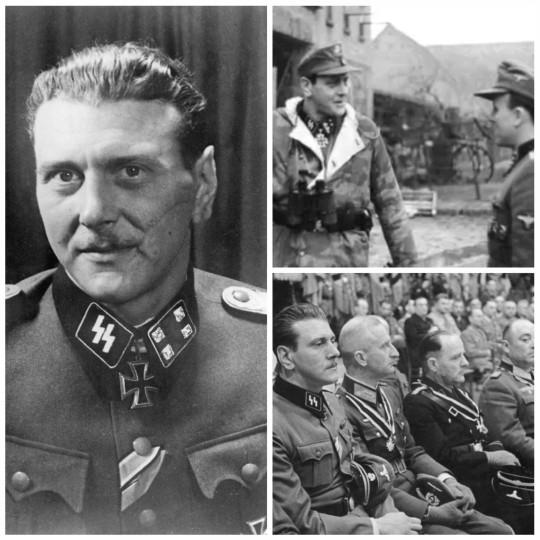
• Otto Skorzeny
Otto Skorzeny was an Austrian-born SS-Obersturmbannführer (lieutenant colonel) in the Waffen-SS during World War II. During the war, he was involved in several operations, including the Gran Sasso raid which rescued Benito Mussolini from captivity.
Otto Skorzeny was born in Vienna on June 12th, 1908 into a middle-class Austrian family which had a long history of military service. His surname is of Polish origin, and Skorzeny's distant ancestors came from a village called Skorzęcin in Greater Poland region. In addition to his native German, he spoke excellent French and was proficient in English. He was a noted fencer as member of a German-national Burschenschaft as a university student in Vienna. He engaged in fifteen personal combats. The tenth resulted in a wound that left a dramatic dueling scar known in academic fencing as a Schmiss (German for "smite" or "hit") on his cheek. In 1931 Skorzeny joined the Austrian Nazi organization and soon became a member of the Nazi SA. A charismatic figure, Skorzeny played a minor role in the Anschluss on March 29th, 1938, when he saved the Austrian President Wilhelm Miklas from being shot by Austrian Nazis.
After the 1939 invasion of Poland, Skorzeny, then working as a civil engineer, volunteered for service in the German Air Force (the Luftwaffe), but was turned down because he was considered too tall at 1.92 metres (6 ft 4 in) and too old (31 years in 1939) for aircrew training. He then joined Hitler's bodyguard regiment, the Leibstandarte SS Adolf Hitler (LSSAH). Skorzeny took part in the invasion of the Soviet Union with the SS Division Das Reich and subsequently fought in several battles on the Eastern Front. In October 1941, he was in charge of a "technical section" of the German forces during the Battle of Moscow. His mission was to seize important buildings of the Communist Party, including the NKVD headquarters at Lubyanka, and the central telegraph office and other high priority facilities, before they could be destroyed. He was also ordered to capture the sluices of the Moscow-Volga Canal because Hitler wanted to turn Moscow into a huge artificial lake by opening them. The missions were canceled as the German forces failed to capture the Soviet capital.
In December 1942, Skorzeny was hit in the back of the head by shrapnel; he was evacuated to the rear for treatment. He was awarded the Iron Cross. While recuperating from his injuries he was given a staff role in Berlin, where he developed his ideas on unconventional commando warfare. Skorzeny's proposals were to develop units specialized in such warfare, including partisan-like fighting deep behind enemy lines, fighting in enemy uniform, and sabotage attacks. In April 1943 Skorzeny's name was put forward by Ernst Kaltenbrunner, the new head of the RSHA, and Skorzeny met with Walter Schellenberg, head of Amt VI, Ausland-SD (the SS foreign intelligence service department of the RSHA). Schellenberg charged Skorzeny with command of the schools organized to train operatives in sabotage, espionage, and paramilitary techniques. Skorzeny was appointed commander of the recently created Waffen Sonderverband z.b.V. Friedenthal stationed near Berlin (the unit was later renamed SS Jagdverband 502, and in November 1944 again to SS Combat Unit "Center", expanding ultimately to five battalions). The unit's first mission was in mid-1943, Operation François. Skorzeny sent a group by parachute into Iran to make contact with the dissident mountain tribes to encourage them to sabotage Allied supplies of material being sent to the Soviet Union via the Trans-Iranian Railway. However, commitment among the rebel tribes was suspect, and Operation François was deemed a failure.
Throughout the war Skorzeny and his unit conducted several additional operations including Operation Oak (Unternehmen Eiche, September 1943) and operation planned to rescue of Italian dictator Benito Mussolini. Operation Long Jump a planned operation to assassinate the "Big Three" (Stalin, Churchill, and Roosevelt) during the 1943 Tehran Conference. The plot was uncovered before its inception. Skorzeny denied any plan existed. Operation Knight's Leap (Unternehmen Rösselsprung, May 1944) an attempt to capture Yugoslavian partisan leader Josip Broz Tito alive. Operation Griffin (Unternehmen Greif, December 1944) a false flag operation to spread disinformation during the Battle of the Bulge, and Operation Armoured Fist (Unternehmen Panzerfaust a.k.a. Unternehmen Eisenfaust, October 1944) the planned kidnapping of Miklós Horthy Jr. to force his father, Admiral Miklós Horthy, to resign as Regent of Hungary in favor of Ferenc Szálasi, the pro-Nazi leader of the Arrow Cross Party. As part of the German Ardennes offensive in late 1944 (Battle of the Bulge), Skorzeny's English-speaking troops were charged with infiltrating American lines disguised in American uniforms in order to produce confusion to support the German attack. For the campaign, Skorzeny was the commander of a composite unit, the 150th SS Panzer Brigade. As planned by Skorzeny, Operation Greif involved about two dozen German soldiers, most of them in captured American Jeeps and disguised in American uniforms, who would penetrate American lines in the early hours of the Battle of the Bulge to cause disorder and confusion. A handful of his men were captured and spread a rumour that Skorzeny personally was leading a raid on Paris to kill or capture General Eisenhower, who was not amused by having to spend Christmas 1944 isolated for security reasons. Eisenhower retaliated by ordering an all-out manhunt for Skorzeny, with "Wanted" posters distributed throughout Allied-controlled territories featuring a detailed description and a photograph. In all, twenty-three of Skorzeny's men were captured behind American lines and eighteen were executed as spies for contravening the rules of war by wearing enemy uniforms.
Skorzeny spent January and February 1945 commanding regular troops as an acting major general, taking part in the defence of the German provinces of East Prussia and Pomerania, and at the Defence of Schwedt Bridgehead. On March 17th, he received orders to sabotage the last remaining intact bridge across the Rhine at Remagen following its capture by the Allies, but the bridge collapsed that same day, and the naval demolitions squad prepared instead unsuccessfully attacked a nearby Allied pontoon bridge between Kripp and Linz. Hitler awarded him one of Germany's highest military honours, the Oak Leaves to the Knight's Cross. After the war was officially over Skorzeny was interned for two years before being tried as a war criminal at the Dachau trials in 1947 for allegedly violating the laws of war during the Battle of the Bulge. He and nine officers of the Panzerbrigade 150 were tried before a US Military Tribunal in Dachau on 18 August 1947. They faced charges of improper use of US military insignia, theft of US uniforms, and theft of Red Cross parcels from U.S. POWs. The trial lasted over three weeks. The charge of stealing Red Cross parcels was dropped for lack of evidence. Skorzeny admitted to ordering his men to wear US uniforms, but his defence argued that as long as enemy uniforms were discarded before combat started, such a tactic was a legitimate ruse de guerre. Skorzeny was detained in an internment camp at Darmstadt awaiting the decision of a denazification court. On July 27th, 1948 he escaped from the camp with the help of three former SS officers dressed in US Military Police uniforms who entered the camp and claimed that they had been ordered to take Skorzeny to Nuremberg for a legal hearing. Skorzeny afterwards maintained that the US authorities had aided his escape, and had supplied the uniforms.
Skorzeny hid out at a farm in Bavaria which had been rented by Countess Ilse Lüthje, the niece of Hjalmar Schacht (Hitler's former finance minister), for around 18 months, during which time he was in contact with Reinhard Gehlen, and together with Hartmann Lauterbacher (former deputy head of the Hitler Youth) recruited for the Gehlen Organization. Skorzeny was photographed at a café on the Champs Elysées in Paris on February 13th, 1950. The photo appeared in the French press the next day, causing him to move to Salzburg, where he met up with German veterans. Shortly afterwards, with the help of a Nansen passport issued by the Spanish government, he moved to Madrid, where he set up a small engineering business. In April 1950 the publication of Skorzeny's memoirs by the French newspaper Le Figaro caused 1500 communists to riot. In 1952 Egypt was taken over by General Mohammed Naguib. Skorzeny was sent to Egypt the following year by former General Reinhard Gehlen (who was now working indirectly for the CIA) to act as Naguib's military advisor. Skorzeny recruited a staff made up of former SS and Wehrmacht officers to train the Egyptian army. Among these officers were former Wehrmacht generals Wilhelm Fahrmbacher and Oskar Munzel; the head of the Gestapo Department for Jewish Affairs in Poland Leopold Gleim; and Joachim Daemling, former chief of the Gestapo in Düsseldorf. In addition to training the army, Skorzeny also trained Arab volunteers in commando tactics for possible use against British troops stationed in the Suez Canal zone. He stayed on to serve as an adviser to Egyptian President Gamal Abdel Nasser. According to some sources, he traveled between Spain and Argentina, where he acted as an advisor to President Juan Perón and as a bodyguard for Eva Perón. The Israeli security and intelligence magazine Matara published an article in 1989 claiming that Skorzeny had been recruited by Mossad in 1963 to obtain information on German scientists who were working on an Egyptian project to develop rockets to be used against Israel. According to their information, a Mossad team had started to develop a plan to kill Skorzeny, but chief Isser Harel decided to attempt to recruit him instead, as a man on the inside would greatly enhance their ability to target Nazis who were providing military assistance to Egypt. No confirmed source can explain Skorzeny's motives for working with Israel, but he may have craved adventure and intrigue and feared assassination by Mossad.
In 1970, a cancerous tumour was discovered on Skorzeny's spine. Two tumours were later removed while he was staying at a hospital in Hamburg, but the surgery left him paralyzed from the waist down. Vowing to walk again, Skorzeny spent long hours with a physical therapist; and, within six months, he was back on his feet. Skorzeny died of lung cancer on July 5th, 1975 in Madrid. He was 67 years old. At no point in his life did Skorzeny ever denounce Nazism. He was given a Roman Catholic funeral Mass in Madrid in August 1975. His body was cremated afterwards, and his ashes were later taken to Vienna to be interred in the Skorzeny family plot at Döblinger Friedhof. His funeral "was attended by dozens of German military veterans and wives, who did not hesitate to give the one-armed Nazi salute", according to former Mossad agents who also attended the funeral.
#second world war#world war 2#german history#military history#espionage#military advisor#ww2#wwii#biography#egyptian history#mossad#interesting story
21 notes
·
View notes
Photo

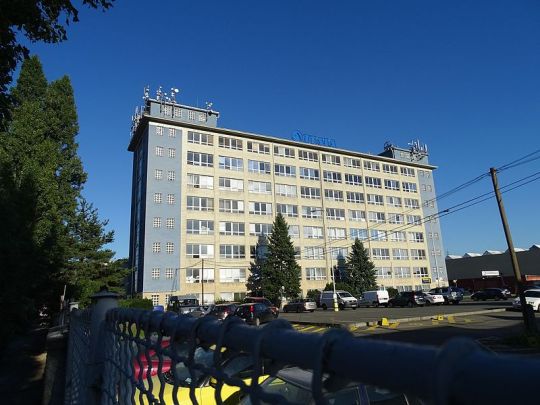



TESLA (originally named after Nikola Tesla, later explained as abbreviation from technika slaboproudá, which means "low-voltage technology") was a large, state-owned electrotechnical conglomerate in the former Czechoslovakia.
The company was established as Elektra on 18 January 1921 and renamed TESLA on 7 March 1946. TESLA had a state-sponsored monopoly on electronics production in Czechoslovakia, and produced nearly all electronic products in the country until 1989. Many subsidiaries were created from the original brand, including those at Liptovský Hrádok, Hradec Králové, Pardubice, Žďár nad Sázavou, Bratislava, and Nižná. Later, some of them were transformed into independent state-owned companies. Tesla a.s. Prague-Hloubětín became a direct successor.
This was officially reported by Radioamator in October 1946: Tesla the National Enterprise was set up on 10 August at the Mikrofon Factory in Strašnice with the participation of Yugoslavian Minister Zlataric Branko, Minister of Industry of North Macedonia Vasilijev Georgie, Minister of Industry of B. Laušman, representatives of government, institutions and universities. The enterprise was named after a genial Slavic technician and it documents the effort for convergence and cooperation among all Slavic nations. The main task of nationalized industry is to quickly overcome all post-war troubles and woes, and to create a socially healthy and productive work environment. Then the Minister declared Tesla as established.
The company had a wide range of production: TVs, radio receivers, transistors, integrated circuits, screens, speakers, gramophones, cassette recorders, CD players, videocassette recorders etc. However, quantity usually did not meet the needs of industrial customers and many products gradually became obsolete simply because they were not updated; e.g. one particular type of diode was manufactured for over 30 years without modifications.
Other products, e.g. some kinds of silicon controlled rectifiers (SCRs) or power transistors were competitive with the world market and so TESLA was the supplier for all Eastern Europe countries. Some high quality products were even exported to western countries, for example, the turntables NC 470 or NC 500 under the tradename Lenco.
In 1953, the production of the first Czechoslovak television Tesla 4001A began in Strašnice. The first Czechoslovak color TV Tesla 4401A began manufacturing in 1974.[1]
The most well-known international Tesla product was the Tesla 308U Talisman bakelite radio designed by Igor Didov of Tesla Bratislava and made by several Tesla company branches between 1953 and 1958[2] and reel-to-reel tape recorder Sonet duo (1959-1965). It was also known for its military passive radar KRTP-86 Tamara (TESLA Pardubice, 1986), which was claimed to be the only one in the world able to detect military "invisible aircraft".[3]
TESLA had to contend with both foreign and new domestic competition after the fall of communism in Czechoslovakia, and had difficulty competing effectively, which resulted in dramatic downsizing and privatization of the majority of its stores and production facilities. TESLA's logo is a rare sight in the present-day Czech Republic and Slovakia, as only a few of its subsidiaries have survived. One of its former subsidiaries, the Slovak JJ Electronic in Čadca is known for its production of vacuum tubes and SEV Litovel is known for its production of high-end turntables known as Pro-Ject.
@niconiconwo
#state-owned firms#State-owned#Eastern Bloc#Eastern Bloc Technology#Tesla#Nikola Tesla#Czechoslovak#Vintage tech#Economic Nationalism
9 notes
·
View notes
Text
Austria-Hungary and the European War - A Hearts of Iron IV AAR
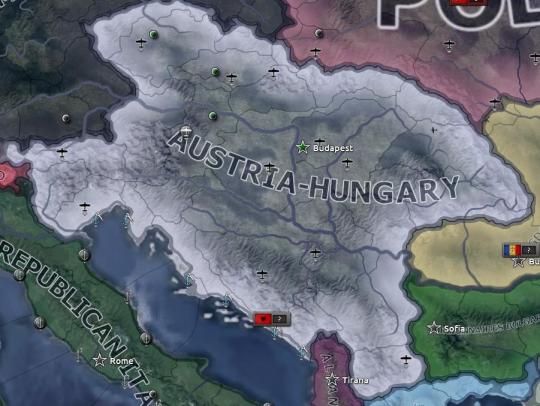
Austria-Hungary today is one of the principal powers of Europe, a highly-industrialized, prosperous and modern country. The krone is considered a major reserve currency, the University of Vienna is held in similar esteem to Cambridge or Harvard, and the Two Crowns are as recognizable as the Union Jack or the 51-starred American flag. Tourists regularly flock to Venice, political summits are regularly held at Budapest, and Austro-Hungarian goods are sold across the world. Yet the meteoric rise of Austria-Hungary was mired in controversy particularly for its role in the Balkan Crisis and the short-lived Hungarian-Yugoslavian war of aggression, and it was only the struggle against the Axis powers that united the western and eastern halves of Europe into a single whole.
Refoundation
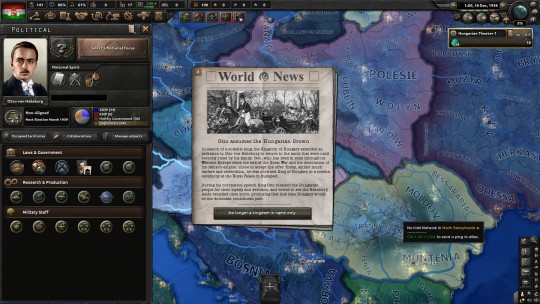
The Kingdom of Hungary was in a precarious position in 1936. Dismembered by the Treaty of Trianon after the Great War, Hungary had seen a succession of ministers promising to restore the prestige of the diminished state from the short-lived Hungarian Soviet Republic to the ardently pro-Nazi Gyula Gömbös. With the failures of both the fascist and communist movements on full display, the Regent Admiral Miklos Horthy elected to work with the monarchist parties, approving their motion for stricter budgetary controls and supporting their call for a restoration of the Hungarian monarchy, giving a famous speech on 8 October 1936 that “a regent is a steward, not a king.” The debate raged as to who would be invited to wear the crown of Saint Stephen, with Frederich Franz of Mecklenburg-Schwerin and Carl Wilhelm of Sondermanland both suggested as candidates. The former with the nationalist Unity Party and encouraged by pro-German elements along with Adolf Hitler, the latter was championed by the liberal parties in the hopes that he would introduce a monarchy modeled upon the Swedish constitutional system. However, the monarchist voices were the most powerful, and they selected as their candidate Otto von Habsburg, to restore the previous prestige that the country enjoyed under Habsburg leadership. At his coronation ceremony on 16 December, 1936, Otto von Habsburg swore to restore the kingdom to prominence, and return the provinces lost in the war. This caused an uproar within the European diplomatic community, with President Edvard Benes of Czechoslovakia and Prime Minister Leon Blum of France providing the strongest voice against the move. When pressed to reaffirm France’s eastern commitments established in the wake of the Great War, Blum was noncommittal, domestic commitments and the weakness of his Popular Front government in the wake of rising violence between the French Communist Party and the nationalist Leagues.
Yet despite the rhetoric, King Otto I took an unexpected policy direction. His first cabinet was dominated by industrial policy, looking to revitalize a decaying industrial structure by importing ideas from the more industrialized nations, particularly the United States, who benefitted from a large trade deal for U.S. Steel. Keenly aware of the limited natural resources, King Otto commissioned an institute to innovate synthetic materials, primarily Buna rubber and oil from coal liquefaction plants, bringing in ideas developed in Germany and the United Kingdom. Even more surprising, Otto convened the Danubian Railroad Summit, inviting Austria and Czechoslovakia to unite their railroad networks, which had suffered since the break-up of the old Austro-Hungarian empire. This move particularly impressed the Austrian people, which sparked pro-Hungarian demonstrations which sometimes descended into violence with pro-German groups who wanted to unite Austria with Germany into one Germanic nation. The pro-Hungarian movement owed much of its support to Otto von Habsburg himself, who had spent much of his time in exile writing on Austrian affairs and made a name for himself as a fierce critic of nationalist policies. While monarchist and Catholic voices were among the most loyal of his supporters, he also enjoyed the support of Austria’s Jewish population, largely concentrated within Vienna, as they had hoped that a government led by Otto could stand up to the Third Reich and a large majority of the middle classes who wanted similar industrial policies to help revitalize Austria’s economy. Even stranger, his fierce opposition to Nazi Germany earned him the support of anti-monarchist groups, most notable among them being the social democrats.
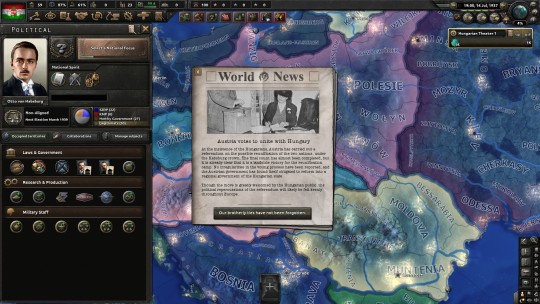
Upon learning of the pro-Hungarian demonstrations, Otto suggested to Kurt Schuschnigg to hold a referendum on reunification with Hungary and the restoration of the Dual Monarchy. With the threat of forcible German annexation on the horizon, Austria agreed to hold the referendum provided that Austria would be seen as an equal, and not merely a junior partner. The date of the vote was scheduled for 15 July 1937, a hot summer day. The referendum was fiercely protested by local communist groups, who boycotted the election and accused the Austrian government of manipulation by foreign powers. Otto encouraged participation by funding street parties for pro-Hungarian political groups, and the results were even better than Otto could have predicted: a landslide victory for unification. The Austrian government announced the results on 16 July, and formed itself into a provincial government under the overlordship of the Hungarian monarchy. Otto assumed the title of Emperor of Austria on 22 September, and proclaimed that the Austria-Hungary of old was reborn, and that he would not rest until all of the former Habsburg territories were brought under one banner.
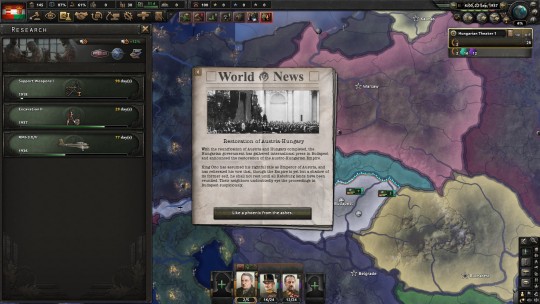
The Balkans Aflame
Almost immediately, this brought a crisis to the Balkan region, with both Yugoslavia and Czechoslovakia expressing concern about Austro-Hungarian ambitions in Eastern Europe, as both provinces were formed in the collapse of the previous Empire and King Otto’s rhetoric on reclaiming lost territory meant he might be thinking of annexing their territories. Indeed, King Otto embarked on lengthy negotiations with Edvard Benes, discussing the return of Czechoslovakia into the Austria-Hungary as the province of Bohemia. The young democracy had a long struggle with balancing the monarchist and republican voices within the country and the fear of Germany demanding the Sudetenland in its goal to establish a pan-German state. Surprisingly, Otto von Habsburg offered a surprising amount of compromise, promising to respect the Czech parliament as well as the language privileges enjoyed by the region during the time of the previous Austro-Hungarian Empire. Noting the political tension between Czechs and Slovaks, Otto offered to continue Benes’s plan of shared industrial growth in order to relax ethnic tensions, a prime example of Otto’s vision of an Austria-Hungary that was a cosmopolitan, poly-ethnic nation. On 1 December 1937, Benes accepted the offered terms of Austro-Hungarian overlordship, and Otto was acclaimed as King of Bohemia. His speech following his accession was careful, stating his respect for “the young parliament and its enthusaiastic supporters,” as an olive branch to the liberal, anti-monarchist factions who opposed the move. Yugoslavia lodged diplomatic protests, stating that the control of the Czechoslovakian army violated the 35,000 man limit on the Hungarian army as stipulated in the Treaty of Trianon. Otto disagreed, noting that the army was trained in Czechoslovakia before its annexation into Austria-Hungary. Benito Mussolini agreed with Hungary’s claims, and French and British did not comment directly, stating that their primary goal has always been the preservation of peace in the region.
With Bohemia within its borders, Austria-Hungary set its sights on the territories awarded to Romania in the aftermath of the Great War. Transylvania, or Siebenbürgen as the Hungarians named it had a large segment of ethnic Hungarians. Romania, ruled by King Carol II under royal dictatorship, refused the gesture out of hand; Hungarian aggression had caused the Great War and the territory was lawfully transferred to Romania as part of war reparations. Upon hearing his refusal, King Otto retaliated by stating that the treaty went against its stated objective of national self-determination and that the Romanians had violated the treaty due to its land confiscation and anti-Semitic policies. Both Otto and Carol moved their armies to the border, neither wishing to back down in a crisis. The news media of the day was alight with articles fearing another Great War that could start at any time, the Balkans lit aflame yet again.
Wishing to avoid a war, Otto suggested impartial mediation through diplomatic back-channels. With Germany hostile, and France already invested in the conflict with its post-war foreign policy guarantees but unwilling to enforce them, the United Kingdom and Italy were named as possible mediators. This move has been considered a foreign policy masterstroke by Austria-Hungary. By being the one to suggest mediation, it engendered goodwill toward France, Italy, and Great Britain. Neville Chamberlain, the United Kingdom Prime Minister, debated a compromise by returning North Transylvania to Hungary within his own Tory cabinet. Italy however, preferred a strong Hungary ever since coming to diplomatic blows with Germany regarding Austria, and recommended that the territory be ceded to Austria-Hungary. The Italian offer reached the Romanian government first, and believing that they would be facing the Italian and Austro-Hungarian armies combined, ceded the territories without a fight. Chamberlain, upon learning of the compromise, believed it to be a Romanian capitulation, and never sent his proposal.
Otto turned his attention to Yugoslavia, which had been struggling with rising separatist movements among the Croats, Macedonians, and Slovenes. Yugoslavia had vociferously protested Austro-Hungarian actions in the region, but found limited support from France and Britain, particularly after Yugoslavia announced claims on Bulgarian lands in the interests of establishing a “South Slav Union” and started quietly sacking officers who opposed German interest in the Balkans. Having already been disillusioned by the failure of the British and French to prevent the re-militarization of the Rhineland, Prince Paul believed that only alignment with Germany would save Yugoslavia from being annexed by Austria-Hungary. The Jewish populations in Macedonia, Thrace, and Dobrudja were particularly anxious about the direction that Yugoslavia was taking. Citing the need to protect Bulgarian lands from Yugoslavian aggression and the need to return the favor for their assistance in the Great War, Otto declared war on Yugoslavia. Thanks in large part to the highly modernized forces produced by the Czechs and the Skoda Works, the Austro-Hungarians were quickly able to penetrate the Yugoslavian defensive perimeter on their shared border. Austrian forces swept into Slovenia, encircling and destroying isolated units. Belgrade fell in less than thirty days, and the Yugoslavian government was forced to evacuate to Skopje. Even a last minute, desperate defense in the southern theater did little to stop the advancing Austro-Hungarian troops. In less than four months, the Yugoslavian government capitulated completely.
While there were several high-profile diplomatic protests from the League of Nations, most media at the time reported great relief that the conflict was a small, contained struggle that did not erupt into a global war. Sanctions were imposed on Austria-Hungary, but these were of limited effect, as the war had ended before major actions could be agreed upon. The United States, citing the Neutrality Act, traded with neither Austria-Hungary nor Yugoslavia, France had withdrawn its guarantee of independence, and Germany declined to help Yugoslavia, unwilling to help a Slavic power. On 24 February, 1939, King Otto, having secured the territory he had lost, proclaimed the restoration and reintegration of the Dual Monarchy, and the rebirth of Austria-Hungary.
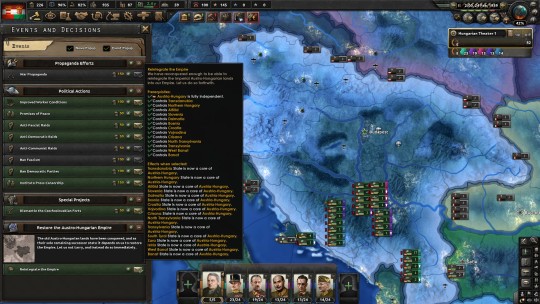
The Sudeten Crisis
Elsewhere in Europe, the great powers were slowly aligning against one another. In 1936, an attempted coup by the Spanish Army had failed and had erupted into a massive civil war. Benito Mussolini and Adolf Hitler quickly sent support to the armies of Nationalist Spain, providing weapons, fuel, and volunteers to assist. Republican Spain had a much harder time finding international support, with only the Soviet Union sending material shipments, while French Prime Minister Leon Blum chaired a Non-Intervention Committee with the United Kingdom, the formation of which led to renewing the Great War-era alliance between the two countries. King Otto joined the Non-Intervention Committee, considering the Spanish Civil War to be a domestic Spanish matter and that the Habsburgs had not been in Spain for over two centuries. During the Civil War, an anarchist rift formed in the Republican faction, with the Regional Defense Council of Aragon refusing to obey Manuel Azaña and starting their own rebellion. The Nationalists, however, were unable to take advantage of this, as they suffered their own coalition fracture between Emilio Mola of the Spanish Directory and Manuel Fel Conde of the Carlist faction. The two factions were driven by irreconcilable divisions over the direction of post-war Spain. In desperation as 1938 began, Azaña accepted Stalin’s offer of expanded Soviet aid. Otto’s refusal to intervene caused a diplomatic rift between Austria-Hungary and Italy, who had expected support in exchange for mediating the Transylvania conflict in Otto’s favor. The Republicans eventually won the civil war on 12 November 1938, and Stalin installed Gabriel Acuna, a retired military officer and ardent Stalinist, as President of Spain, who immediately suspended elections and fired all non-Communist ministers, and instituted emergency laws to allow him to dissolve the Chamber of Deputies in favor of regional Soviets and establish a one-party state. Manuel Azaña, despondent over the death of Spanish democracy, never recovered, and died of illness shortly after the war’s conclusion in exile in France.
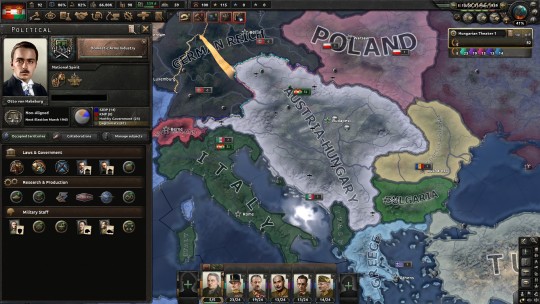
The loss of such a state to communism caused Germany and Italy to mend their diplomatic fences. In a famous speech, Mussolini declared: “France, Britain, and Austria-Hungary are unwilling to face the Bolshevik menace.” and signed the Pact of Steel, a treaty of cooperation with the German Reich. Shortly thereafter, the two announced a military alliance. Italy began to court Bulgaria as another possible member of this “Berlin-Rome axis,” Afterward, Italy demanded that Albania’s King Zog cede the country to be ruled in a personal union under Victor Emmanuel III, and Greece received a similar demand from Hitler in June 1939. King Zog of Albania submitted to Italian demands, stating that Albania did not have the manpower to resist Italian invasion and that he would not murder his citizens for pride. Greek Prime Minister Ioannis Metaxas defied the demands, and Germany declared war on 15 June 1939. The invasion of Greece was quickly condemned by United Kingdom Prime Minister Neville Chamberlain, who issued an ultimatum: leave Greece immediately or face war. When Hitler refused, the United Kingdom declared war, joined by France and the various Dominions. This was too late for Greece, which could not receive reinforcements and was forced to capitulate. The failure of the Allies to protect Greece led to a vote of no confidence in Neville Chamberlain, who was replaced by his deputy, Winston Churchill. At Stuttgart, Hitler made a grand show of turning over control of Greece to his alliance partner Mussolini. Diplomatic historians have theorized that this overture was directed at governments which were not part of the Allies, in the hopes of causing them to join the Axis powers and becoming a part of the new European order to receive similar boons of territory.
This development caused a crisis within the Austro-Hungarian cabinet. With Greece and Albania administered through Italian puppet governments, the south flank of the nation was exposed, and if Bulgaria joined the Axis powers, they would be almost completely surrounded. Austria-Hungary’s relationship with the United Kingdom had been frosty ever since the war in Yugoslavia. Several councilors suggested rapprochement with the Axis powers, or attempting to split Mussolini and Hitler to break up the Axis and align with Italy against Germany. The left suggested approaching Stalin for a defensive pact. In a defiant response to the Greek and Albanian submission, Austria-Hungary declared that the countries of eastern Europe were free and independent powers, offering independence guarantees to Romania and Poland to protect them from Axis expansionism, much to the surprise of King Carol II. Hitler began to fund pro-fascist political groups and parties within Austria-Hungary, using nationalist sentiment against the poly-ethnic nation and promoting rhetoric that Otto’s policies were causing ruination of the region, that he must be deposed and Admiral Horthy must be returned to shepherd the government, in the hopes that the 1940 elections would cause domestic unrest and Austro-Hungary distracted by concerns at home. Wehrmacht officers suggested that Hitler thought little of the Austro-Hungarian military, confident that it was full of “weak and backwards races that would crumble against German armor,” and that he wanted to maintain focus on his war with France and the United Kingdom. German groups in Austria were their prime target, but Hitler also targeted Slovaks in eastern Bohemia in an attempt to stir up the divisions that had been present in Czechoslovakia. This effort caused a rise in nativist parties in the north and south of Austria-Hungary. King Otto retaliated with a large-scale crackdown on fascist groups, typically under a flimsy excuse of violating public safety laws, but fascist sentiment grew.
Almost a year after the February Proclamation, Germany, citing the principle of ethnic self-determination and a German state for the German people, demanded that the Sudetenland be ceded to Germany. Konrad Heinlein, leader of the Sudeten German Party and a Great War combat veteran, campaigned publicly for the cession of the territory. King Otto proclaimed Konrad a traitor to the Empire, to which Heinlein responded “You lived in comfort for your nation, I lived in a prison. Which of us has given more?” Street violence followed between the Legitimist monarchist party and the Sudeten German Party, and the First Royal Army Group was positioned along the border from Tyrol to the eastern Sudeten, the Second on the border near South Tyrol, and the Third sent to Macedonia on the border with the Albania and Greece. As the deadline for the German ultimatum drew near, King Otto remained defiant, proclaiming to the emergency session of the joint National Assembly “The Germans may have their war if they dare..The Czech people gave me their trust, and I give it to every man on the border down to the lowliest private. I nor any of the citizens of this reborn nation shall sacrifice this great enterprise.” When the deadline expired, Germany issued a formal declaration of war with Italy following less than four hours later. Austria-Hungary was now at war.
Opening Gambit - The Invasion at Zara, The Greek Campaign, and a War on Two Fronts
While the Wehrmacht had hoped to push into Austria-Hungary from the north, early attempts were repulsed by the extensive fortification network in the Sudetenland and the Austrian mountains. The heavy fortifications and powerful Austro-Hungarian artillery left the theater in a precarious stalemate, neither side able to break through enemy fixed positions. The initial moves from Austria-Hungary had better luck, with the Austro-Hungarian Fifth Army pushing south, deep into enemy territory in Italian-occupied Greece. Initial records from the battle had cited the brilliance of the commander, General Lajos Verees, but later analysis of the war had shown a lack of coordination between Hitler and Mussolini on the war plans for Austria-Hungary. Mussolini’s army had been organizing the annexation and administration of the new Greek holdings, the sudden increase in territory had forced Mussolini to assign many of his forces in that region to garrisons and coordination with the new puppet government while the majority of his trained forces were stationed on the French-Italian border. Several divisions had not even shown up, delayed in transit as Mussolini had to organize an Albanian and Greek regional government. The Italians that had been mobilized had made a valiant showing, but ultimately were forced to cede territory as garrison forces were scrambled at fallback positions and artillery was airlifted to provide firepower for the reeling army.
Hitler had originally intended to reinforce Italian holdings in Greece, but Admiral Karl Donitz suggested a bolder push, to reinforce Italian holdings at Zara and push into Austro-Hungarian territory, hoping to spark a panic. The Austro-Hungarian navy was barely functional, as the shipyards on the Dalmatian coast had only recently been acquired, and intelligence suggested that the Austro-Hungarian only had a few destroyers and submarines staffed with barely trained naval forces. Hitler gave his approval, and the Kriegsmarine launched Operation Blue Serpent. The results were astounding, the combined Italian and German naval force was able to overwhelm the patchwork Austro-Hungarian Navy and force a landing at Zara. From there, Axis forces overran Split and Rijeka in Dalmatia before a relief force under Austro-Hungarian general Fritz Lipfert was able to form a battle line in Bosnia. The loss of vital industrial facilities severely hampered Austro-Hungarian war production. President Franklin Roosevelt’s proposal to extend the Lend-Lease Act to Austria-Hungary met with resistance even from his own party, but an impassioned speech by Harry Hopkins was able to secure the passage of the bill, and Austria-Hungary was able to manage the supply shortfall. In public recognition of the material support, King Otto commissioned a statue of an American factory worker entitled: “The Hands of Freedom.”
In a surprising and stunning move, Romania elected to send volunteer detachments in support of Austria-Hungary, which constituted themselves under Lipfert’s command as the Foreign Corps. This was done at the behest of the new king Michael. Carol II, who had long irritated his government with his wild, hedonistic lifestyle, had been deposed in a bloodless coup by his son, and declaring the need to stand against Axis oppression, sent volunteer forces to fight with the Austro-Hungarians. The Foreign Corps and the Austro-Hungarian Sixth Army set up their headquarters in Ljubjlana. Michael I also offered to mediate dialogue between Otto von Habsburg and Winston Churchill. The Copenhagen Conference was productive, with Austria-Hungary and Romania both welcomed into the Allies.
Hitler was reportedly furious. Coordination between the Austro-Hungarians and the British meant that he was facing a war on two fronts. Historians speculate on Hitler’s expectations, whether he had anticipated a greater result from Konrad Heinlein, that Otto von Habsburg would cede the Sudetenland rather than risk being encircled by the Axis, that previous bad blood between Austria-Hungary and the United Kingdom regarding Yugoslavia, or that Austria-Hungary would sue for peace following the successful landings at Zara. There are no surviving written records of the strategic objectives, but military historians consider this to have been one of the greatest strategic mistakes of the 20th century.
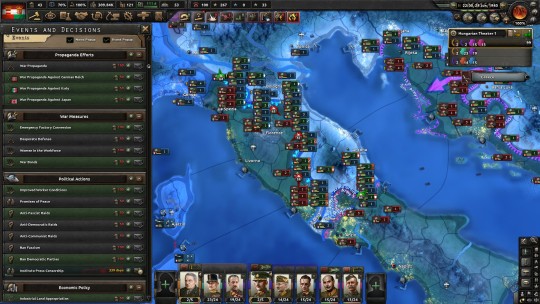
The Push Through Italy
With Greece re-captured and under Austro-Hungarian control, the Allied War Council met in London to discuss war strategy. Of the two Axis Powers, Germany possessed the more accomplished and capable army. France wanted to push into Italy, removing the weaker power before bringing all forces to bear on Germany. Austria-Hungary, by contrast, wanted reinforcements in Eastern Europe, to liberate Dalmatia before striking at Germany to the north. Italy, Marshall Luza, leader of the Austro-Hungarian Second Army Group, believed that the Italians were contained, argued: “If we should break the German back, Mussolini will surrender and the war will be over before autumn.” The United Kingdom agreed with France, stating that if Northern Italy were cleared, France could reinforce the battle lines in Dalmatia, while the Royal Navy could keep the Adriatic clear and prevent any reinforcements to the Axis lines. With any luck, once the Axis expedition was cut off from supply shipments from the mainland, they would surrender en masse before starvation began to bite. As an acknowledgement that Austria-Hungary had some of its territory occupied, Great Britain and France agreed to detach several divisions to help hold the battle lines in Austria-Hungary, setting up an expeditionary corps headquartered in Banja Luka.
In March 1940, the Italian campaign was kicked off in earnest. Austria Hungary ordered a push from the Second Army Group toward Venice, while France ordered a major assault toward Genoa and Milan, while sending a destroyer group to secure the Corsica-Sardinia strait and support an amphibious assault on the small Italian island. The United Kingdom prepared a naval invasion from Egypt, hoping to strike Sicily once Mussolini had sent his forces northward. By April, French forces had taken Milan, but Genoa had been reinforced by a large number of infantry and armor divisions, Mussolini’s elite. Genoa was taken, but it was hard fought. Austria-Hungary had better luck, pushing through Venice and beginning the push along the Adriatic Coast. The Second Army Group experiencing a stunning breakthrough, with Italian forces falling back to Florence and establishing a fighting position in the hilly terrain outside the city. Austro-Hungarian and French troops, along with detached British divisions, met at Bologna, and theater commanders agreed to exploit the Austro-Hungarian breakthrough, bypassing the fortified Italian fighting positions in Florence. May saw further Italian retreats as the Allied forces pushed into Ancona and the successful launch of the British invasion of Sicily and the fall of Palermo, which became the main naval staging yard for further Mediterranean operations. The Royal Navy successfully contested the Mediterranean, and by the end of May Italian ships found it incredibly difficult to leave port either in the west or the east.
Operations continued into June, although hot weather slowed the tempo. Dogged resistance in the hills of Florence had failed to dislodge the Italian positions, and Allied war planners feared a stalemate that would permit the German army to redouble production efforts, push south from Germany, and possibly threaten the war effort. British efforts to push from Sicily to the Italian mainland had similarly stalled. Bohemian Marshal Luza of the Second Army Group, always an aggressive commander, suggested pushing toward Rome instead, charging Richard Tesařík with the task. Tesařík’s idea was called Operation Saber, better known as the Corneo Needle, where an infantry force would push southeast from Ancona while the spearhead of light tanks and motorized infantry would push through the center of the Italian peninsula. The Italian field officer took the bait, dispatching a relief force from Anzio to support the defense of the east. Followed closely by French infantry, Tesařík’s forces began shelling Rome to the surprise of the Italian defenders. On 28 June, 1940, Rome fell to the advancing Allies. Disheartened, the Italians pulled further south, but the isolated Florentine hill forces were unable to regroup, digging in. The dogged Italian defenders fought for two months, during which the famous war memoir “Colline Rossa” was written. As the Italian Army began to crumble, King Victor Emmanuel seized control of the Italian Parliament, arrested Mussolini, and sought an armistice. On 27 August 1940, Italy surrendered to a joint Allied delegation. Hardline Fascist holdouts persisted, moving their provisional government to Crete, but the British Navy bottled them on their island, and they played no part in the remainder of the war.
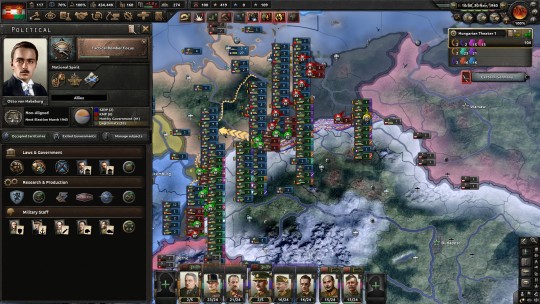
Hitler’s Gamble, the German Lemon Squeeze, and the Postwar Order
With Italy lost, Hitler faced a losing war. Strategists within the Nazi council debated, with many suggesting making a peace overture, but Hitler refused to consider it. Instead, he embarked upon a daring gamble, a westward push through the Low Countries, bypassing the Maginot Line and threatening Paris. The prevailing theory among military historians is that Hitler hoped a display of strength would force a general ceasefire before the Allied armies could march north from Italy to threaten Germany. A few days before the Italian Army surrendered, Hitler attacked Belgium and the Netherlands. However, British cryptologists at GCHQ led by Alan Turing had uncovered the plans. Belgian and Dutch defenders had fortified their positions, reinforced by the British Army, and had been able to repulse Hitler’s plan. Disgusted by the German actions, the United Mexican States, under President Lázaro Cárdenas, joined the Allies, and sent a small expeditionary force to supplement the Low Countries defense.
The Austro-Hungarian army, having secured Italy, began the slow march north to the central European mountains, spilling over the Austrian border and pushing slowly toward Munich. British and Dutch forces advanced from Frisia while French forces began to emerge from their Maginot defenses and attacked southwestern Germany. Hitler’s force, spread out, were significantly outnumbered, and began to take heavy losses.
The Allies developed their plan as a broad pincer movement, for an aggressive attack moving both north and east, not stopping until they had received an unconditional surrender. General Bernard Montgomery had caused a slight diplomatic row when he wagered with Austro-Hungarian general Géza Lakatos that the British could take Berlin before the Austro-Hungarian even got there, to which he was privately censured by Churchill for antagonizing his coalition partner.
As September came, Austria-Hungary took Munich, where the First and Second Army Groups split, with the First marching north while the Second marched west to press German divisions stationed between the French and Austro-Hungarian lines together. It was here that the combined Allied offensive received the nickname “Lemon Squeeze.” In discussion with French reporters, an unknown sergeant said “Of course we’re going until we see the French on the other side! When you squeeze a lemon, you do not stop until there is nothing left but the rind!” By November 30, the Austro-Hungarian army proved the unknown sergeant correct, as they had closed the fronts save for a holdout force of 20 German divisions near the Swiss border. At a joint session of air command, British bombers volunteered to begin all-out strategic bombing including hard-to-fly night bombing raids, where the smaller Austro-Hungarian bombers would cover tactical bombing and free up the larger British planes for more important missions.
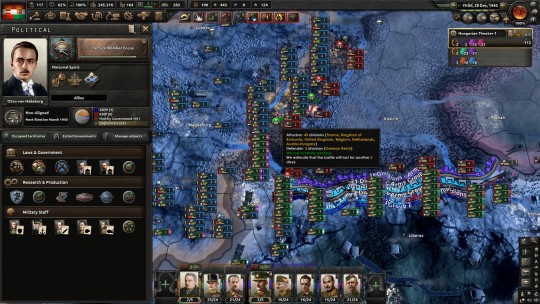
The Belgian-British-Dutch-French breakout in the west accomplished the most success in the German theater, sweeping through northern Germany, while the Austro-Hungarian northward attack had only reached Leipzig. General Lakatos, angered that Montgomery might win his bet, ordered a redoubled effort, and detached line troops to march across the Belgian front to Magedburg, and then to march east to attack Berlin. Three days after Christmas, Austro-Hungarian forces radioed to the joint Allied command outside Berlin that they were joining the assault, much to Montgomery’s chagrin. With 43 divisions outside the gates and Hitler out of communication, the fall of the German Reich came swiftly. On the fourth of January, 1941, Hitler’s body was found within his improvised command bunker, dead of a self-inflicted gunshot wound, and the German Reich formally surrendered.
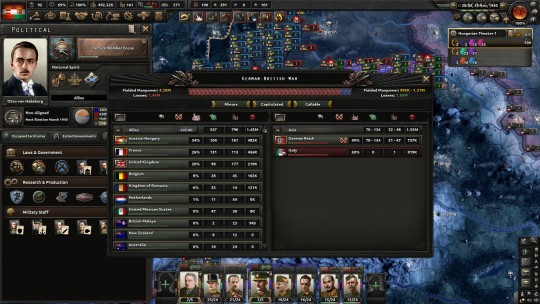
While the war was devastating, the casualty count was much smaller than the Great War, with slightly over 3 million military casualties total, although this was only an 11-month conflict. At the Peace of Konigsberg, the Allied Powers set out their aims for post-war Europe. Greece was liberated and founded as the Hellenic Republic of Greece. Occupied Lithuiana was similarly reorganized, with Memel being returned. Austria-Hungary wanted to reinstate Victor Emmanuel as King of Italy and the territorial concessions of Venice, Istra, and South Tyrol, while the United Kingdom favored Ferrucio Parri and re-established borders. A compromise was hastily made, permitting the territorial concessions, but establishing Italy as a constitutional monarchy, with Victor Emmanuel having little political power. Germany was reorganized as a republic, with Konrad Adenaur becoming the first Chancellor of a newly democratic Germany. Austria-Hungary returned Albania to King Zog with much fanfare, a victory procession into his country. In less than a year, the threat of fascism was lifted from Europe, though tensions still ran high. Joseph Stalin eyed Polish territories and Bessarabia with hungry eyes, and the United Kingdom has taken a firm stand against the brutal oppression happening in Spain. Japan continues to threaten China in the Pacific, and both the United States and the United Mexican States worry about Venezuelan aggression in South America. War may come again, and the world may not be so lucky next time.
The Dual Monarchy Today in 1941
The Austro-Hungarian military is a modern and sophisticated fighting force. While not as large as the French or Red Army, the Habsburg army is a well-funded and well-equipped force with modern infantry, artillery, and armor divisions. Austro-Hungarian warfare is dominated by firepower theory, stressing a mobile defense, artillery barrages called in by forward observation units from advanced firebases, and an integrated support structure. This last notion is particularly important, as Austria-Hungary is famous for its support corps, among the most highly trained individuals in the military profession today. Austria-Hungary developed an extensive military engineering corps capable of breaching obstacles and building field fortifications to both protect its own and bypass the defenses of the enemy. The Royal Patrol School develops skilled reconnaissance squads, with its infamous “High and Low” course on mountain and forest recon being internationally notorious for its difficulty. An early adopter of military radio, the Royal Signal Corps helped to pioneer backpack-sized signals equipment and field telephones. Armor corps have dedicated maintenance divisions to keep tanks in repair, as early conflicts with Yugoslavia were littered with broken-down tanks causing delays in military timetables. Most highly prized, however, are the logistics and hospital corps, when one British general said: “If I get hurt, please let me be picked up by the Habsburgs!” These two were of special interest to King Otto, and he invested a great deal of capital into developing field surgery equipment and a highly educated logistics staff, recalling the grueling conditions suffered by Austro-Hungarian troops during the Great War. Austro-Hungarian military thinkers have emphasized the need for dedicated supply in both men and materiel, with logistics study mandatory in all officer academies. These developments came as a result of an extensive motorization program, with Otto von Habsburg famously declaring: “A modern war is a truck war,” and permitting the motorized and mechanized infantry divisions to name themselves the Hussar Corps, distinct from the Royal Hussars, a primarily ceremonial unit present at most Austro-Hungarian state functions.
Austria-Hungary also fields a small special forces program. Of particular note are the Royal Mountain Corps, based off the Alpini program in Italy. The Corps, often nicknamed the Skyscrapers or the Hold-Your-Breath Squad, often provide training and consultation to other nations on developing and maintaining a trained mountain warfare program, and inter-Allied drills on mountain warfare are often conducted in Austro-Hungarian territory. The Danubian Marine Corps primarily trains in river and marsh warfare, specializing in high-speed bridging operations.
On the sea, the Austro-Hungarian navy is not a true blue water navy. As much of the earlier Austro-Hungarian navy was disbanded, Austria-Hungary had little in the way of development with its navy, and naval warfare was often seen as a distant third priority compared to land and air warfare, much to Austro-Hungarian chagrin when the Axis were able to land forces in Zara. His Majesty’s Navy primarily acts as a coastal and Mediterranean force, primarily destroyers and cruisers and a small but well-established submarine force. King Otto, however, is looking to modernize the navy with a focus on aircraft carriers with destroyers acting as escort and heavy cruisers providing firepower from naval guns.
In the air, Austria-Hungary boasts a well-trained and well-equipped air force. The Austro-Hungarian Air Force’s most famous planes are its RMI-8 X/V and it’s RMI-16. The former is a heavy fighter, primarily an air superiority and bomber escort, a large, twin-engine heavy fighter, while the latter is a streamlined medium bomber. The Austro-Hungarian Air Force is a relatively small service, with an operational doctrine toward flexibility. Bomber pilots are expected to be able to perform at both strategic bombing and close air support missions. Drop-out rates for its Bomb School are high due to the intense demands of the course, but the pilots who successfully complete them are among the most decorated and talented members of the Austro-Hungarian armed forces.
Imgur Links for Full-Size, images are in the same order that they are in the AAR
Austria Hungary country map
Otto Assumes the Hungarian Crown
Austria Agrees to Unite with Hungary
Restoration of Austria-Hungary
Before the War Begins
The Italian Push
The German Lemon Squeeze
The Battle of Berlin
War Score and Participation
-SLAL
33 notes
·
View notes
Text
cold war commies (soviets)
Beria (1899-1953)
Georgian like Stalin
Headed the Soviet atomic program
Executed after Stalin’s death
Gromkyo (1909-1989)
“Grim Grom”, “Mr Nyet” (= mr. no)
1943: ambassador in Washington
Deputy foreign minister under Molotov
Attended Yalta and Potsdam
UN Soviet delegate during 1946-48
Khrushchev (1894-1971)
Nivita no wait its Nikita Khrushchev
Admirer of Stalin (until Stalin died!)
Communist Party leader in Moscow and Ukraine in 1953+ (after Stalin’s death)
Supported purges
Lenin (1870-1924)
Inspired by European Enlightenment (that stuff from yr 12) --> utopian (Commie) ideals
Democratic centralism!
McCauley: “Stalin was a key aide in 1917 and afterwards Lenin tried to smooth the acrimonious relationship between Stalin and Trotsky”
I guess we know enough about this guy anyways?
Testament before he died: warned Bolshies about Stalin’s tendency to abuse power but too late!!
Maisky (1884-1975)
“Pussy face” hahahah what
Soviet ambassador to Britain (Court of St. James); popular among British diplomats
Pressed for the 2nd Front (which finally opened up in 1944)
Deputy foreign minister as well
Attended both Yalta and Potsdam too (like Gromkyo)
Malenkov (1902-88)
Wartime: member of GKO
GKO = state defense committee
Joined politburo in 1946
Deputy prime minister
Pro-West!
Molotov (1890-1986)
Loyal to Stalin
“Bootface”
Foreign minister
Signed the Nazi-Soviet Pact (a.k.a. molotov-ribbentrop pact!)
If you’re not Stalin, I can’t love you
Anti-West, like really really anti-West.
Stalin (1878-1953)
Crazy megalomaniac
Pushed collectivization and socialism to the limits, by his standards ofc
There’s no time for Stalin’ if you’re Russian to industrialize!
In 1942 pushed for a 2nd Front
Western allies tried to stall and instead invaded Italy in 1943 which made Stalin suspicious about Western intents, until it finally opened up in like 1944
80% of Axis resources during the war directed against the USSR
Eastern hoard (thanks lucas!) --> until D-Day (Jun. 1944) all resources were directed against the USSR
Cautious and paranoid as hell
Everything a matter of Soviet “honor and security” and couldn’t afford another invasion from the West
Russia invaded 3 times since 1900s from the West
--> partly reason for sphere of influence? who knows
Tito (1892-1980)
The Commie guy Yugoslavia needed, but not the guy Stalin needed
Participated in Oct. 1917 and returned to Yugoslavia a Commie
During WW2, led Partisans
Made himself Marshall who managed to suppress Yugoslavian nationalism
Admired Stalin, but wanted to develop his own Communism
Salty about Stalin during the Greek Civ. War that he wasn’t helping the Greek Commies enough
Expelled from Cominform in June 1948 --> Tito-Stalin Split
Backed by the US and later accepted the Marshall Aid
Didn’t get enough aid from Stalin!
Vyshinsky (1883-1954) - creds: lucas
Called a “human rat” by Leonard Schapiro
Led the Moscow Trials
Born to a Polish bourgeois family affiliated with the Mensheviks, not trusted by Stalin
Well-educated, but a puppet of Stalin
Admired by Hitler
Thought to have said “Give me a man and I will find the crime”
Zhdanov (1896-1948) - creds: lucas
Overseer of cultural orthodoxy, but personally more open-minded
Enforced Socialist Realism
Led the creation of Cominform (1948) at Szklarska Poreba
Died in 1948, Beria and Malenkov used this as an excuse to arrest his associates for murdering him
Zhukov (1896-1974)
WW2 Red Army Marshall / commander
Defeated Japanese in 1939 in Mongolia
Jul. 1941: Chief of the General Staff
Commissar for Defense
Also June 1941 was Operation Barbarossa (Hitler invades USSR)
Oct. 1941 successfully defended Leningrad, then Moscow
Troops reached Berlin in Apr. 1945
Stalin cautious of Zhukov’s popularity (Jun. 1945 Victory Parade)
USSR Deputy Minister of Defense
3 notes
·
View notes
Text
Matt x Mello headcanons
Mello is a little clean freak and does most of the household
Matt loves to cook for his blonde queen
Matt's nickname for Mello is Miško, Mello's for Matt is dragi (darling)
Mello loves to lay next to Matt on the couch and play guitar or read while Matt is playing videogames
Matt taught Mello how to hack
Matt killed for Mello and would do it again
Mello has sleep disorders and can sleep normally only when Matt is with him
The secret of their relationship is Matt's patience
Mello the brave gets very shy when it comes to talk about his feelings; Matt instead talks very openly about them
Matt said I love you first, Mello gave the first kiss
Matt is the calculating one between them, Mello trusts him blindly
Their fights are mostly because Matt is a messy guy and leaves his dirty clothes everywhere and Mello freaks out when he has to do the laundry
Matt calls Mello princess to mock him, but he treats him like a queen
Their closets are overfilled with Mello's designer clothes and shoes and the bathroom is full of his beauty products
The shelves of their flat are mainly for Matt's videogames
Mello is a spoiled bitch and loves to get Matt's attention
Mello is very religious, Matt is an atheist but got baptised to make Mello happy
Being an insecure person, Mello is very jealous and possessive, Matt instead is not jealous at all. He knows Mello loves him
Mello is needy for love, attention and sex and Matt gives him everything
Both Matt and Mello have Yugoslavian origins but are from different parts that now are different states. They felt a deep connection when they met at Wammy's probably because of this reason
Neither Matt or Mello had loving parents and both suffered from abusive households. Matt comes from a wealthy family, Mello from a poor one
On free days they like to have long car rides. Matt always drives and Mello sits there and talks while enjoying their time together
Mello is very moody and only Matt knows how to calm him down or cheer him up
Matt suffered a lot when Mello had left Wammy’s and him. He tried to get over him but he never stopped seeking for him and loving him
Matt saved Mello from death after the explosion and took care of him. He saved Mello other times too, he knows Mello is a pro in getting in trouble
Matt never cared for Kira, he just helped Mello so he could catch him before Near
Matt is 100% loyal to Mello and would never betray him, not even under torture
Their love is so deep and their bond so strong that not even they understand
@itsaloistrancy666 asked me to write down some MxM headcanons. I'll do a separate nsfw one too
17 notes
·
View notes
Photo
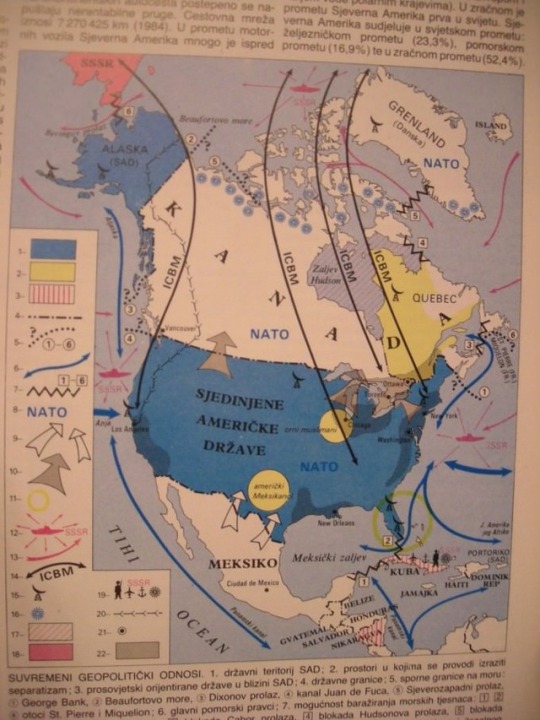
Yugoslavian map of a near-collapsing US during the Cold War.
shirt_mask:
“While on vacation in Dubrovnik, Croatia this summer, we ran across an old Yugoslav atlas which included this map on the entry for the US. My Serbo-Croatian isn’t so good so I don’t know the true details as to what it’s about, but it appears to be plans for a Russian invasion,” says Andrew, who sent in this map.
“Submarines labelled SSSR are on both coasts. The apparent flight paths of ICBMs are marked. Cuba’s soldiers and bases are indicated (…) If you can figure out more precisely what’s going on I’d certainly be curious, and I imagine that other readers would get a kick out of it.”
My Serbo-Croatian isn’t very good either, but the map does seem to speak the language of the Cold War. Guessing the exact year is complicated as national borders in the Americas have remained stable in the last few decades, unlike in other parts of the world, where they allow easier carto-dating.
A look at the actual legend of the map does allow for some closer dating. Item #3 (the red vertical stripes) indicates the pro-soviet regimes in the hemisphere – Cuba and Nicaragua. The inclusion of that second country limits the timeframe of the map to 1979-1990, the era when the Sandinistas were in control of Nicaragua.
Although the Soviet navy has got the North American continent completely surrounded, in my opinion, the map does not demonstrate a Soviet plan of attack, but restates the Communist ideological orthodoxy of the US as an aggressive, unstable monstrosity at near-collapse – a remarkable example of the pot calling the kettle black.
• Whereas blue indicates the US itself (Sjedinjene Americke Drzave, acronym SAD – but that is a coincidence, I presume), yellow indicates ’separatist’ forces at work in the North American continent, such as Quebec (although that is a Canadian, not a US issue) and Black Muslims (around Chicago) and Mexican-Americans (in Texas). Again, a pretty remarkable comment, coming from a Yugoslav atlas.
• Item #5 on the legend indicates, I think, ‘disputed’ marine boundaries, mainly between Canada and the US, thus misrepresenting the mainly friendly relations between those two countries – the disputes might be real, but their significance is relatively minor.
190 notes
·
View notes
Text
(FOX006LP) THE MASTER SCRATCH BAND - THE BREAKWAR (CASSETTE REISSUE WITH BONUS TRACKS)

THE MASTER SCRATCH BAND THE BREAKWAR LP 1984 CASSETTE REISSUE WITH BONUS TRACKS Remastered, limited edition, gatefold LP, extensive liner notes and bonus tracks. BUY HERE!
The Master Scratch Band was first break-dance / hip-hop / electro funk band in Yugoslavia released and signed by major label in 1984. The band members were Zoran Vračević, Zoran Jevtić and Milutin Stoisiljević, previously known as Data (Goran Marinković, Zoran Jevtić, Zoran Vračević) and Šizike (Goran Marinković, Jasmina Branković, Jasna Dimitrijević, Ljiljana Dimitrijević, Milutin Stoisiljević, Zoran Jevtić, Zoran Vračević).
Jugoton, the biggest label in Yugoslavia, published Data 7'' and MSB's 'Dégout' 12'' with limited edition cassette containing two bonus tracks. Impossible to find on the collectors market, Fox & His Friends team in collaboration with Jugoton / Croatia Records is releasing a full, complete version of the rare "The Breakwar" tape, with tracks "Tonight" and "Pocket" never pressed on vinyl. All tracks are sourced from original studio tapes. With the kind help of Zoran Vračević on credit list and liner notes, this is now the ultimate Master Scratch Band album, released originally in a year when break-dance was in the peak of its popularity in Yugoslavia.

While Data was synthpop, Šizike mellow synth-disco recorded in private studio, this release is pure breaks and hip-hop electro, done old-school way in one of the best studios in Yugoslavia, Enco Lesić's Druga maca in Belgrade. MSB used impressive electronic gear and were helped by huge list of famous musicians and guests: Dubravka Duca Marković from hit-show 'Hit meseca' (Yugoslavian Top Of The Pops); Japanac on bass, Max Vincent from Max & Intro on synths, Dudu Vudu from Du-Du-A, Goranka Matić as photographer and many more. MSB sampling technique and choices are unique: from obscure industrial records to freestyle; from found-sounds to cut-up breaks and even real prank-calls.

This is document of time that still sounds fresh and needs to find it's new, young audience of hip-hop history researchers, break-dancers, b-boys, b-girls and DJ's. When you know that it's produced in 1984 Yugoslavia, far away, but actually, so close to its USA brothers and sisters, it's even more mind-boggling. Thanks to Fox & His Friends and Jugoton CR collaboration, this gem is waiting for your freezes, footwork and electric boogie moves.
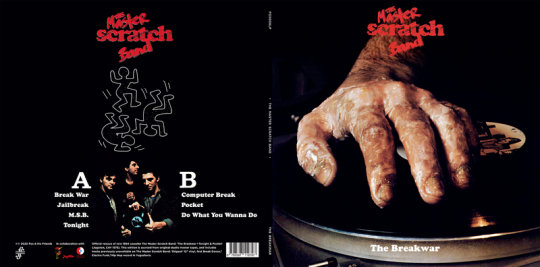
THE TRACKS
a1 Break War
a2 Jailbreak
a3 M.S.B.
a4 Tonight
b1 Computer Break
b2 Pocket
b3 Do What You Wanna Do
Equipment used: Commodore 64 Computer, Roland MC-4B Microcomposer, Prophet Pro-One, RSF Cobol II Expander, Korg Mono-Poly Synthesizer, PPG Wave 2.3 Synthesiszer, PPG Waveterm Computer, Boss DE-200 Digital Delay, Drumtraks Digital Drum Machine, Roland TR-808 RH. Composer, Electro Harmonix Vocoder, Linn Drum MKII, Juno 60, SH-101, SVC-350, VP-330 Vocoders, Polysix & MS10, Simmons drum module

Reissue Producers, Creative Direction and Research: Leri Ahel & Željko Luketić Liner Notes: Željko Luketić Design: Dejan Kršić Mastering: Miroslav Piškulić Transferred by: Goran Martinac Legal: Frane Tomašić Licence: Jugoton Croatia Records Rights Society: HDS/BIEM ©℗ 2020 Fox & His Friends
#Yugoslavia#hiphop#break#breakdance#breakdancing#electro#scratch#Zagreb#Belgrade#Serbia#ZoranVracevic#data#sizike#synthesizer#rocksteadycrew#mantronix#shannon#socialism
0 notes
Text
Smart watch with Gps 4 Covid
The Govt instead of disturbing people with corrupt police officials can make such as in the link below or buy en-mass and resell to her citizens like with speed governors to detect covid as it has a smartphone app where each person can check 4 another or in the net by incorporating the serial no of that watch and on the detective side in their office instead of wearing, kinda, woman thong or pant on the nose breeding disrespect in kids thinking its baby pamper
https://jamanetwork.com/journals/jama/fullarticle/2773660
https://www.indiatoday.in/coronavirus-outbreak/story/smartwatch-detect-coronavirus-signs-before-symptoms-1742687-2020-11-20
https://www.cbc.ca/radio/quirks/dec-5-a-mysterious-light-from-the-universe-undoing-cellular-ageing-feather-talking-and-more-1.5827266/your-smartwatch-might-be-able-to-detect-early-signs-of-covid-19-1.5827272
https://zalotech.com/starscope/i3m.php?utm_term=1006886&utm_source=indiatoday-indiatoday&utm_medium=taboola-starscope-7460199&utm_campaign=7460199&utm_content=2953671346&geo=KE&rtkcid=5feedde83eb867000178478c&rtkcmpid=5fc2acf556cf6400010db65f#tblciGiAEVddX6CVajLGz1acl0hotbDMS_xRAaoUkeOKPBszBayCJr1Io7qj9kM2khsmLAQ
https://www.eurekalert.org/multimedia/pub/244527.php
https://www.macworld.com/article/3533344/apple-google-android-fitbit-smartwatch-body-temperature-covid-coronavirus-symptoms.html
https://www.flipkart.com/fitbit-inspire-hr/p/itmb061956b725d9?pid=SBNFEJUWEGT2Q4SU&affid=HotDeals20&affExtParam2=redpixel&affExtParam1=40415862
https://www.amazon.in/dp/B07MM5W7Q8?tag=kp-web-rhs-21&linkCode=ogi&th=1&psc=1&SubscriptionId=AKIAJZ7ZVEW7WHEFIMWA&ascsubtag=40415888
https://www.army-technology.com/news/usamrdc-selects-empatica-for-covid-19-early-detection-wearable/
https://www.theverge.com/2020/3/27/21197056/apple-coronavirus-covid-19-website-app-online-screening-tool-cdc
Accept dude, if u got want free thing and maybe thief, when all loopholes to crime closed, even if u got it, u got it from the above, lest u have much u can leave to ya kid and lest again he will suffer or be prostitute, so accept u r of bad character and get off kids dude not meaning u r harassing them as i said earlier, where will it take ya if u love kids more than others yet they got cash than u and u poor and the signs of getting rich as above closed u cant get rich, so wants to ambush the innocent one in broad daylight with silly lies bro
Eliminating liquid cash as close in the link below as u can read between the line bro, not a myth but all reality dude
https://www.washtec.com.au/additional-profit-centres/hamilton-cashless-transaction-kiosk/
https://www.kioskmarketplace.com/photos/kal-cashless-retail-transaction-machine-launch/
https://kioskindustry.org/cash-accessibility-cash-free-and-cashless-kiosks/
https://www.tddtec.com/m/view.php?aid=139
https://www.shutterstock.com/video/clip-24103993-contactless-payment-cashless-credit-debit-card-technology
https://kioskindustry.org/cash-2-card/
https://www.mobilemoney.net/cashless.html
http://m.opencroquet.org/wholesale/pz664618e-cz50462d5-bank-self-service-cashless-atm-kiosk-terminal-on-the-wall.html
https://www.atmmarketplace.com/news/singapores-ocbc-bank-launches-cardless-atm-withdrawals-using-qr-codes/
https://kioskindustry.org/atm-style-kiosk-pumps-out-pirate-movies-to-usb-sticks-torrentfreak/
https://www.kioskmarketplace.com/news/the-philippines-moves-to-cashless-contactless-highway-toll-collection/
https://www.alibaba.com/product-detail/Wall-Mounted-Cashless-Kiosk-Machine-with_60265671697.html
You look on both sides either to steal or hurl ya feces in heavy downpour dude as in the links below with ankle on CD thing bro
https://www.youtube.com/watch?v=cw2hE3ur5RU
https://www.youtube.com/watch?v=NFnKgIptbq0
With making software 4 phones, computers, stereo or Tv set or any e-gadget take the machine and step on with hole on CD hole or on any round made hole as always explained like with Cd hole step on, on cabbage, banana, hay or welding plate, the heap on the slab like wood or concrete, V-shape going down or upwards or on tarmacked or dry weather road dude and as u chop like hay on wood soaked in cabbage soup but cooked in sand or wood soaked in pineapple juice chop with broken pieces of welding plates or mango pieces or animal Hyde chop on wood soaked on mango juice in sand or soaked in mango juice wood chop pineapple in mud dude and with on road place ankle on Cd hole on the painted wall or on the same rough road or mud thatched house wall b4 washing ya feet with women or grandpa like people in spirit as methylated or in mineral water or in kerosene and more solutions dude and boom ya software as remote control via a phone and PS5-4 SOFTWARE and any known to ya bro. Give it a try homie, Grass and hay can also form the heap, apple and guava, chilies with pawpaw or with hay to aid the above procedures bro
Even the name of the machine u want to make u can print on a piece of paper or its folded mini photo or broken part b4 u step on within Cd hole as u wash ya feet with kids women, youths or adults in different mixtures and solutions or chop many veggies, fruits and berries or leaves in wood soaked in milk in sand or soaked in porridge in grass or soaked in pineapple in mud or single alone or Hyde of animals in wood soaked in stew in grass or in any juices or extracts with stones, welding plates, mango seed and all cut small pieces of veggies and berries or leaves on the same wood to elevate ya from doing it on a single basis as u can grind all to form juices or extract dude next to ya house bro, the heap combination as above can form the heap 4 write name of even machines names as cars and electronics u want to make dude and even military vehicle dude
When using treated water in all household usage as washing clothes, toilets and more gives ya curse as other lacks the same, either making ya head big as u should desist and use the untreated parts from well or nearby rivers but not alone but en-mass or ya city water department should create time 4 the treated part and 4 the untreated part hours so above controlled and water bill reduced as they charge people much cash out of that many find pinch to pay dude like in early morning hours treated part and in late evening as the other hours gives u untreated part so is upon ya to store treated part 4 ya utensils and if u partake it dude
Carrot in hay add raw paw paw, ankle on Cd hole on painted wall, then chop guava with euphorbia wood on metallic plate with the sponge like soft white part of the meat thing with stew and boom a drug that treats Amoeba dude as u can hide Mgombero inside the heap or cooked stew mud fish or landana as wild sunflower and neem tree leaves
Cabbage in hay, ankle on Cd hole on wall as above chop cabbage on wood soaked in ripe paw paw on a plastic platform on the ground or road dude and u can add paw paw heap and mango, Cd hole on wall, then wash ya feet in surgical spirit in metallic bucket with kids and women the other leg on bare ground in dim light and boom ya drug and u can hide as well those mentioned above 4 effective results dude as 1 forwards me the same
Swag loving people are swana and most from Swaziland as women lovers get to know that and Zanzibar people got corrugated lips as curse of the Oman inversion and Yugoslavian people got upper set of teeth a head of lower teeth and if u use things made out of awiny tree leaves makes ya upper lips small while the reverse with camara, so to correct both use them altogether but tiny both lower and upper lips as well as with pussy if u smear or partake, get it dude and pro-act bro
0 notes
Photo

Will Biden's presidency be a 'blessing' for war-torn Ukraine?
Kyiv, Ukraine - Ukraine is "blessed" with Joe Biden's victory in the November 3 presidential election.
That is what Petro Poroshenko, the former leader of war-ravaged Ukraine, the birthplace of the political maelstrom that nearly swallowed President Donald Trump and his presidency, tweeted on Sunday.
“Ukraine is blessed to have a US President with [such a] profound and personal knowledge of our country, ”Poroshenko, who led Ukraine in 2014-2018, when Moscow annexed Crimea and backed separatists in two southeastern regions, tweeted in English.
Ukraine is blessed to have a US President with so profound and personal knowledge of our country. With a firm US bipartisan support of Ukraine to stay strong, we look very much forwards to a committed transatlantic leadership of the United States to secure the Free World. pic.twitter.com/NWfBYLHs1O
- Петро Порошенко (@poroshenko) November 7, 2020
Biden's knowledge of Ukraine is indeed profound - and apparently surpasses that of any other US leader in history.
While serving as Barack Obama's vice president, Biden was his Ukraine point man. He came to Kyiv six times, last time in January 2017, just days before Trump took office.
Biden joked he spent more time on the phone with Poroshenko than with his own wife. Since 2014, Biden helped oversee Washington's military aid for Kyiv, and prodded Poroshenko, once Ukraine's mightiest oligarch, to weed out corruption.
And yes, Biden's knowledge of Ukraine is somewhat personal.
He to withhold a hefty loan to Poroshenko's cash-strapped government if the president refused to fire Prosecutor General Viktor Shokin for alleged corruption.
“'I'm leaving in six hours. If the prosecutor is not fired, you're not getting the money. ' Well, son of ab ****, he got fired, ”Biden said in 2018 during a discussion at the Council for Foreign Relations in Washington, DC.
But Shokin also investigated Burisma, a natural gas company that gave Biden's son Hunter an apparently sinecure and well-paid job on its board of directors in 2014.
“I think [Biden] went against the interests of the [American] state, against the interests of Ukraine, as he pursued only his and his family's greedy interests, ”the 68-year-old ex-prosecutor told this reporter in May 2019.
Trump and his administration echoed the claim saying the dismissal was supposed to protect Hunter Biden. His push to investigate Biden dates back to the now-historic phone call on July 25, 2018, to Poroshenko's successor and political nemesis Volodymyr, Zelenskyy.
Zelenskyy, a former comedian with zero political interests who came to power after denouncing Poroshenko's nationalism and failed war on corruption, tried to avoid addressing the Biden-Burisma affair and chose not to take in the political sides battle on Capitol Hill.
Zelenskyy understandably seemed relieved at Biden's victory.
“Ukraine is optimistic about the future of the strategic partnership with the United States,” he tweeted on Sunday.
Departing from Trump's inconsistent stance
Even in comparison with the 45th president's chaotic, impulsive and scandal-ridden foreign policy steps and missteps, Trump's stance towards Ukraine was especially inconsistent.
“Trump had very ambiguous conceptions about Ukraine, and his emotions were also very ambiguous,” Vladimir Fesenko, head of the Penta think-tank in the Ukrainian capital, Kyiv, told Al Jazeera.
Following his conversation with Zelenskyy, he froze almost $ 400m in military aid necessary for Kyiv's efforts to fight pro-Russian separatists in Europe's hottest armed conflict since the Yugoslavian wars.
But in 2018, Trump allowed the sale of lethal Javelin missiles that were crucial in repelling rebel tank attacks.
During his 2016 election campaign, Trump hinted he may recognize annexed Crimea as part of Russia - and claimed the Russian-speaking population of the Black Sea peninsula “would rather be with” Moscow.
However, later in his term, he boasted he was “tougher” on Russian President Vladimir Putin than Obama.
In 2017, Trump cold-shouldered Poroshenko in the White House, and never invited Zelenskyy to visit Washington.
And Ukraine nearly buried his presidency. In February, the Democratic-dominated House of Representatives impeached Trump for “using his official powers to pressure” Zelenskyy's government, but the Republican-led Senate acquitted him.
More sanity?
Although Ukraine has enjoyed bipartisan support from the US, analysts expect an improvement of ties under Biden.
“There will be changes for the better, but only because there will be no Trump's impulsiveness and unpredictability,” analyst Fesenko said.
Biden's view on Ukraine was much more straightforward and steadier.
During his election campaign, Biden lambasted Crimea's annexation, promised to boost help to Ukraine. He called Moscow Washington's biggest foreign “threat”.
However, some observers are sure he will be cautious in restraining Russia's resurgent projects abroad and ending the separatist conflict in southeast Ukraine.
“The military support to Ukraine in this current form will go on, and the US will hardly hog the covers from Germany and France trying to increase its role in the endless peace settlement that doesn't promise a fast and big success,” Pavel Luzin , a Russia-based defense analyst with the Jamestown Foundation, a think-tank in Washington, DC, told Al Jazeera.
A bigger picture
Biden is determined to end Trump's trade wars with China and the European Union and pursue a higher budget deficit accompanied by a steady growth of the Federal Reserve rates.
This could prove fatal to Ukraine's fragile economy hobbled by military expenses, a double exodus of hundreds of thousands of refugees from the Donbass region, and millions of labor migrants to the EU - and, its own trade war with Russia.
Ukraine's key exports are grain and steel, and the possible strengthening of the US dollar under Biden may undermine the Ukrainian hryvnia.
Biden's economic plans “could lead to the weakening of currencies in developing nations, including the hryvnia, and reduced opportunities for Ukraine and Ukrainian companies to access global capital markets for new loans”, Aleksey Kushch, an analyst based in the Ukrainian capital, Kyiv, told Al Jazeera.
Meanwhile, many average Ukrainians remain indifferent by the changing of the guards in the White House.
“The old president was unpredictable, the new one is, they say, senile,” Viktoria Poleshchuk, a 49-year-old bookkeeper in Kyiv, told Al Jazeera. “We don't care. We're too busy with our survival here. ”
. #world Read full article: https://expatimes.com/?p=13749&feed_id=15911
0 notes
Link
#vintageposter #vintageposters #vintagepostersonly #vintageposterart #vintagepostersforsale #vintagepostera #avintageposter #vintageposterb #bvintageposter #vintagepostercollector #wallart #wallartdecor #wallartwork #wallartist #wallartprint #wallarta #wallartartist #awallart #posterstore #postershop #pósters #aposters
#yugoslavian #yugoslavianarchitecture #yugoslavıa #yugoslaviandesign #yugoslaviaarchitecture #yugoslaviaart #ayugoslavia
#yugoslaviaposter
0 notes